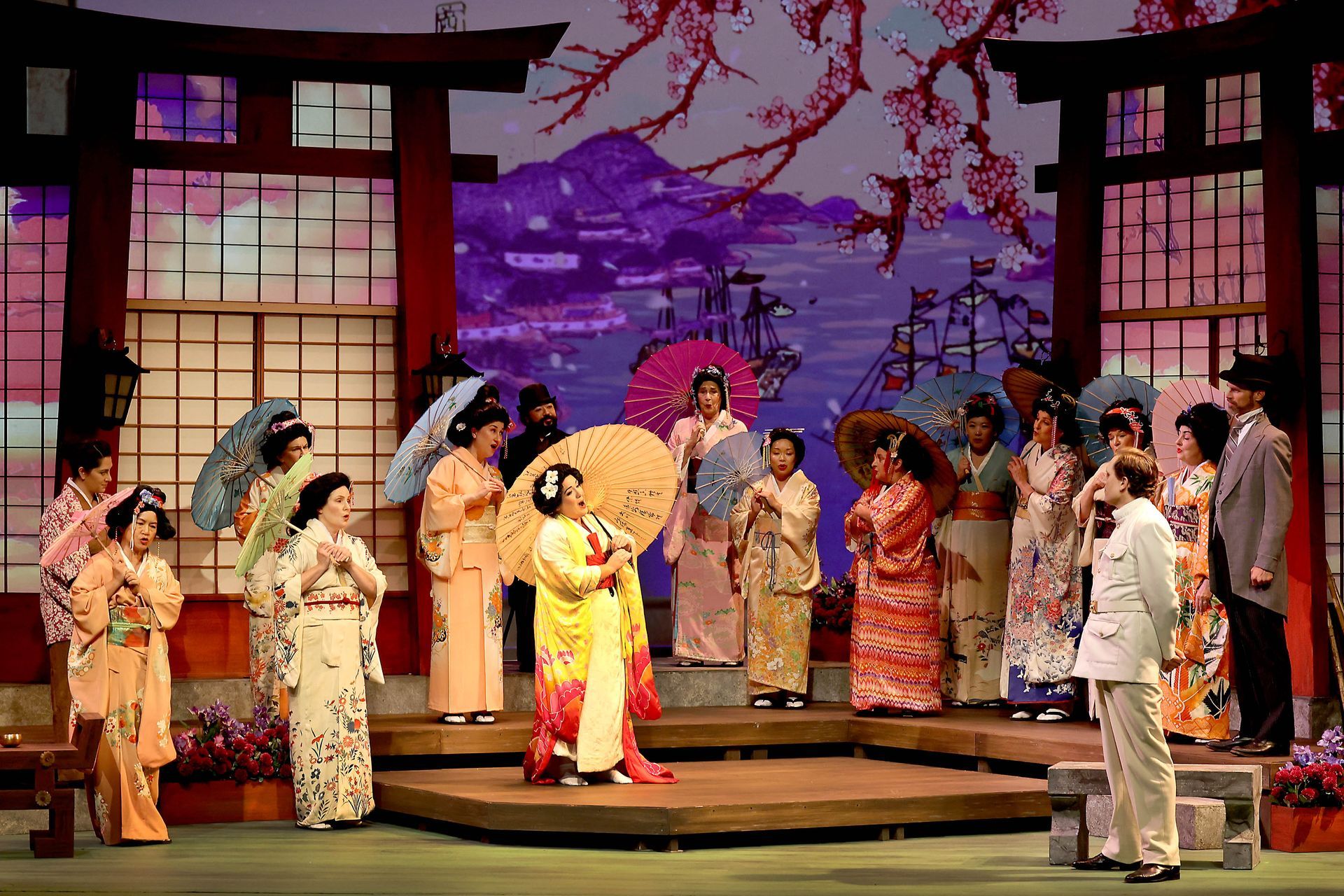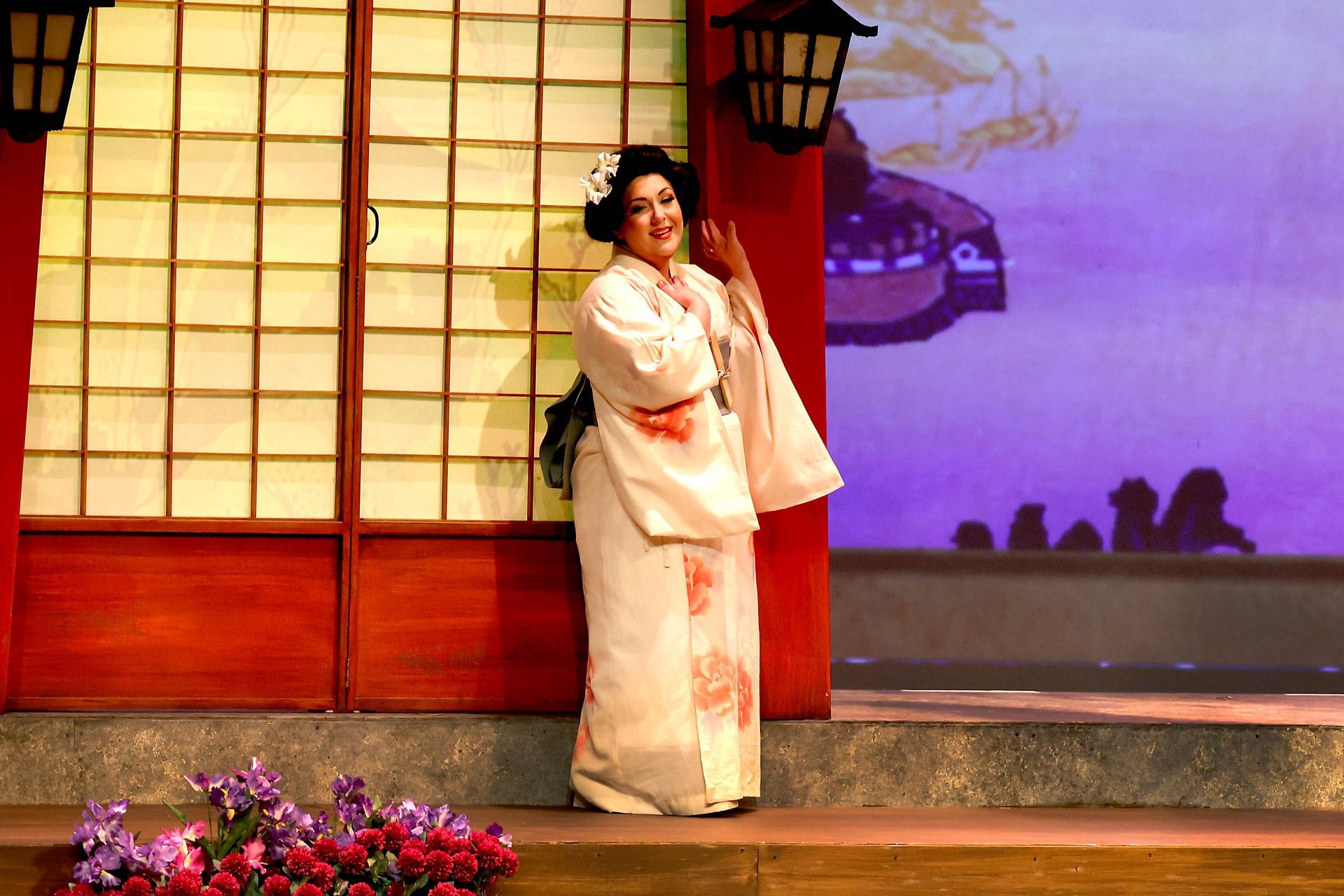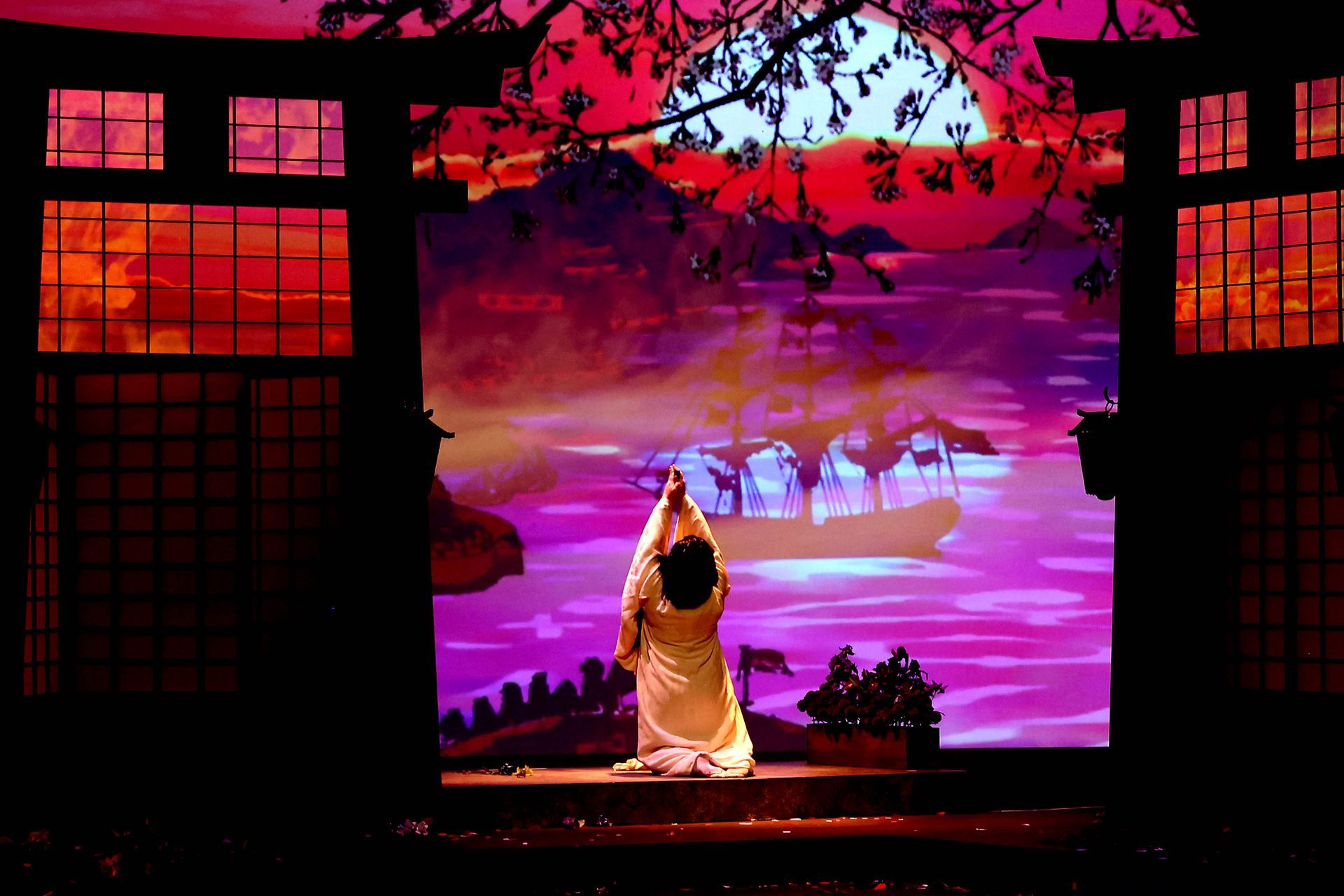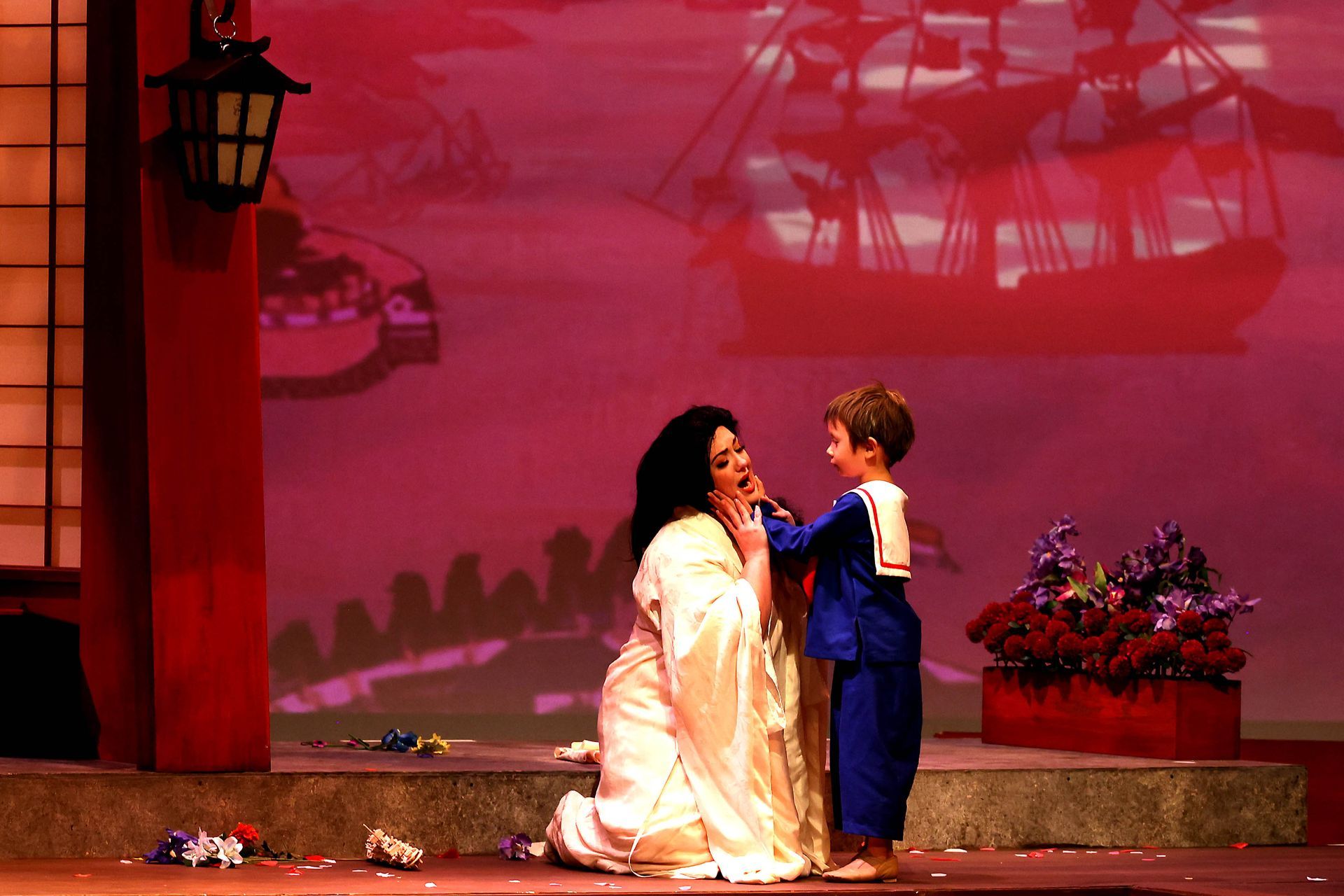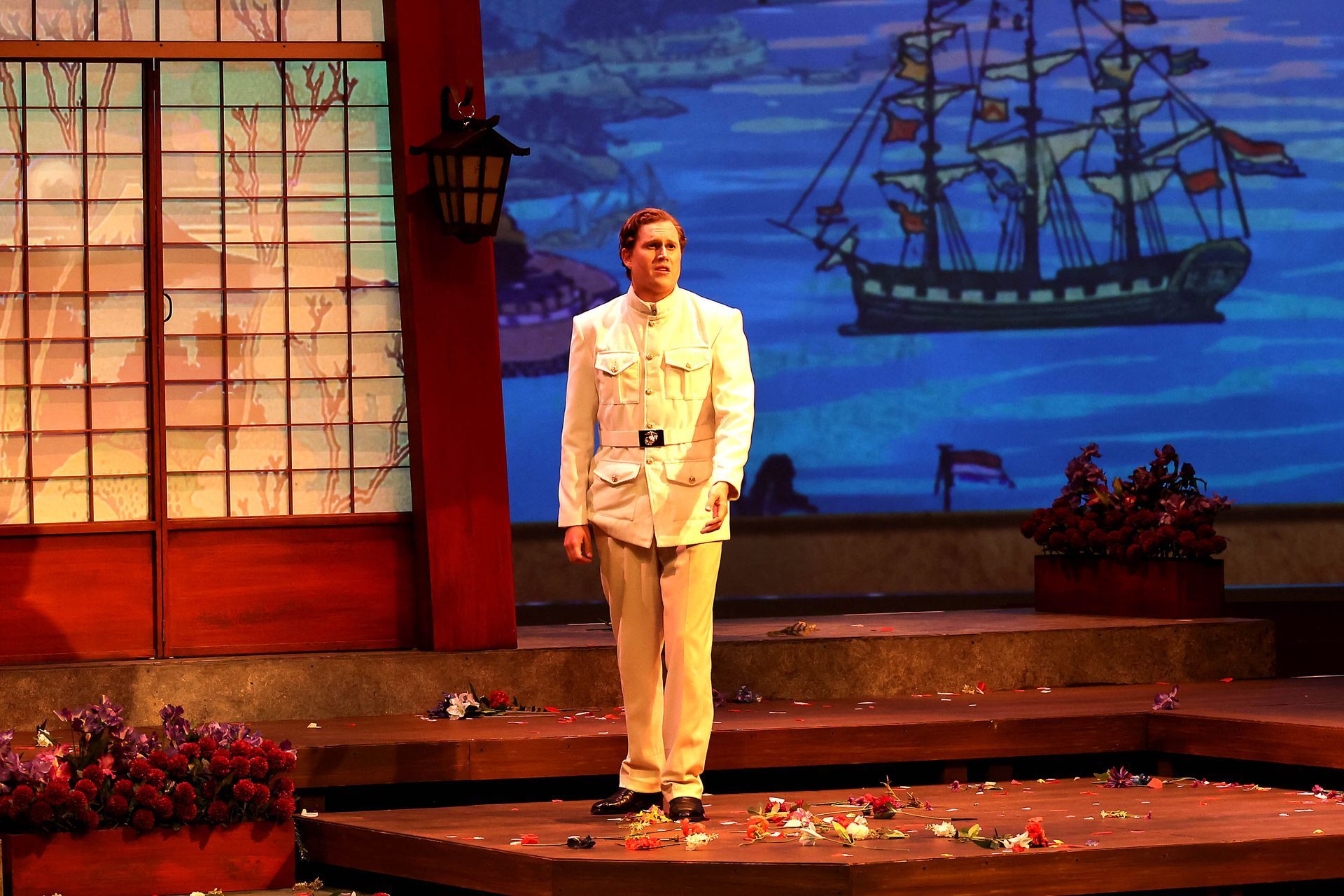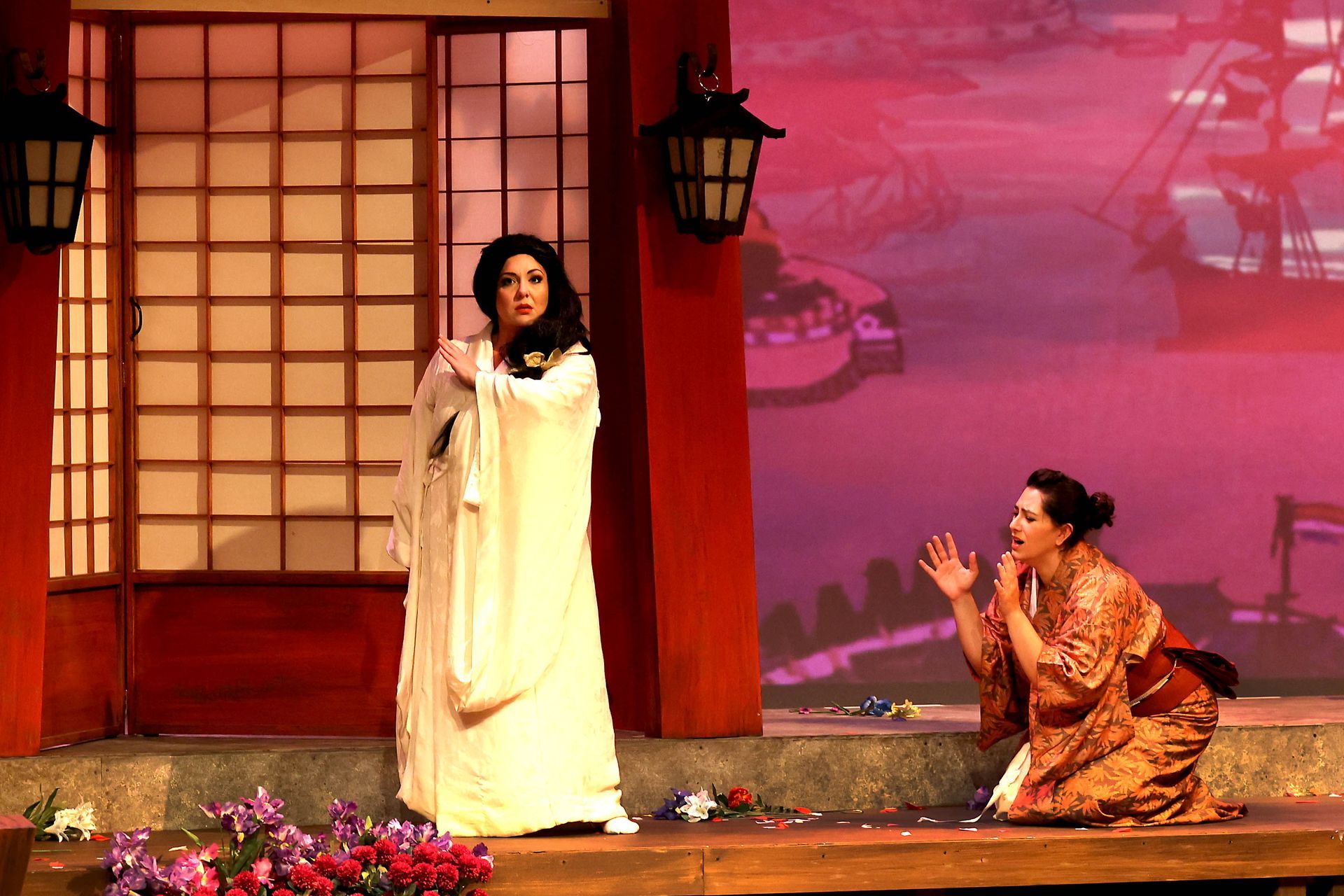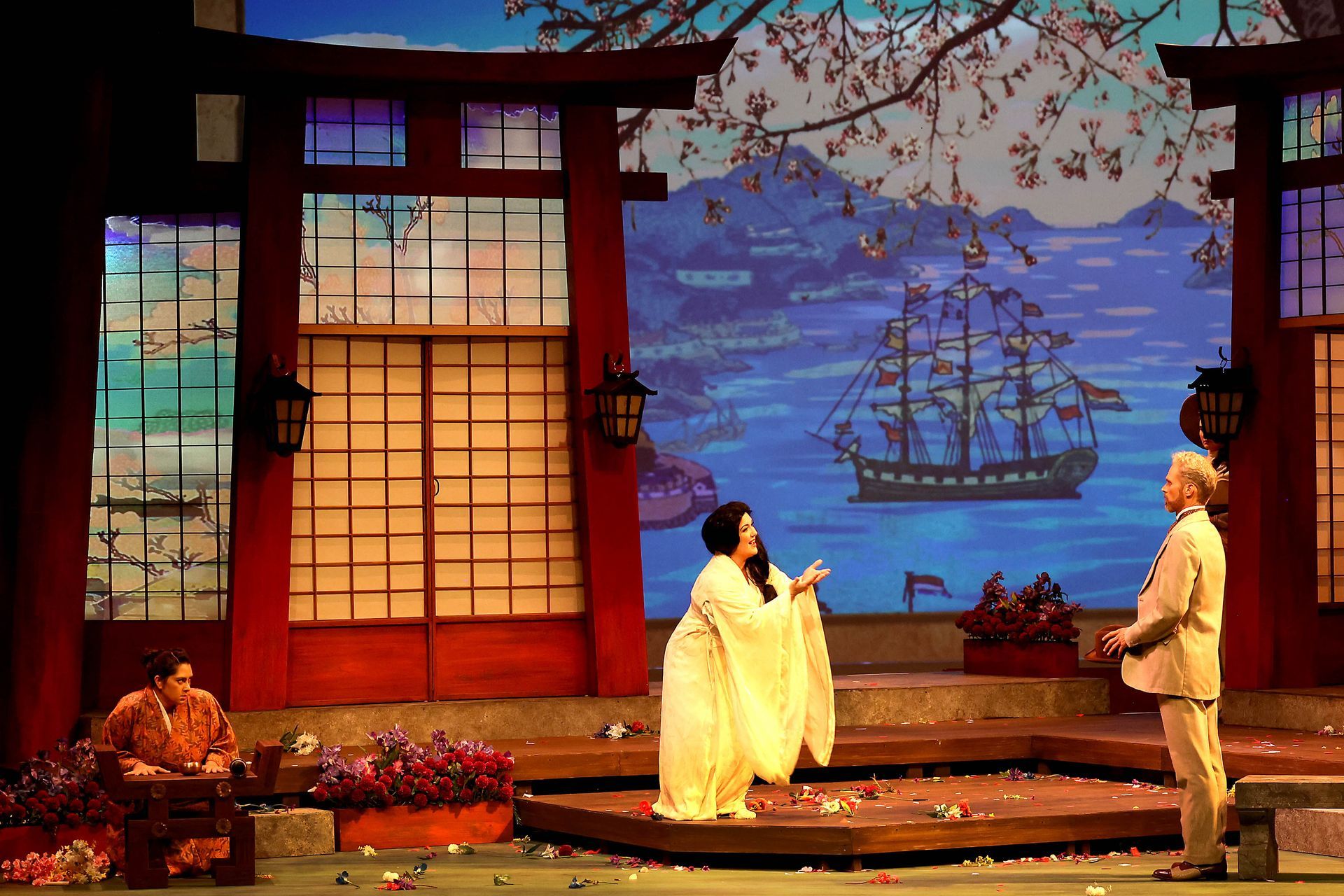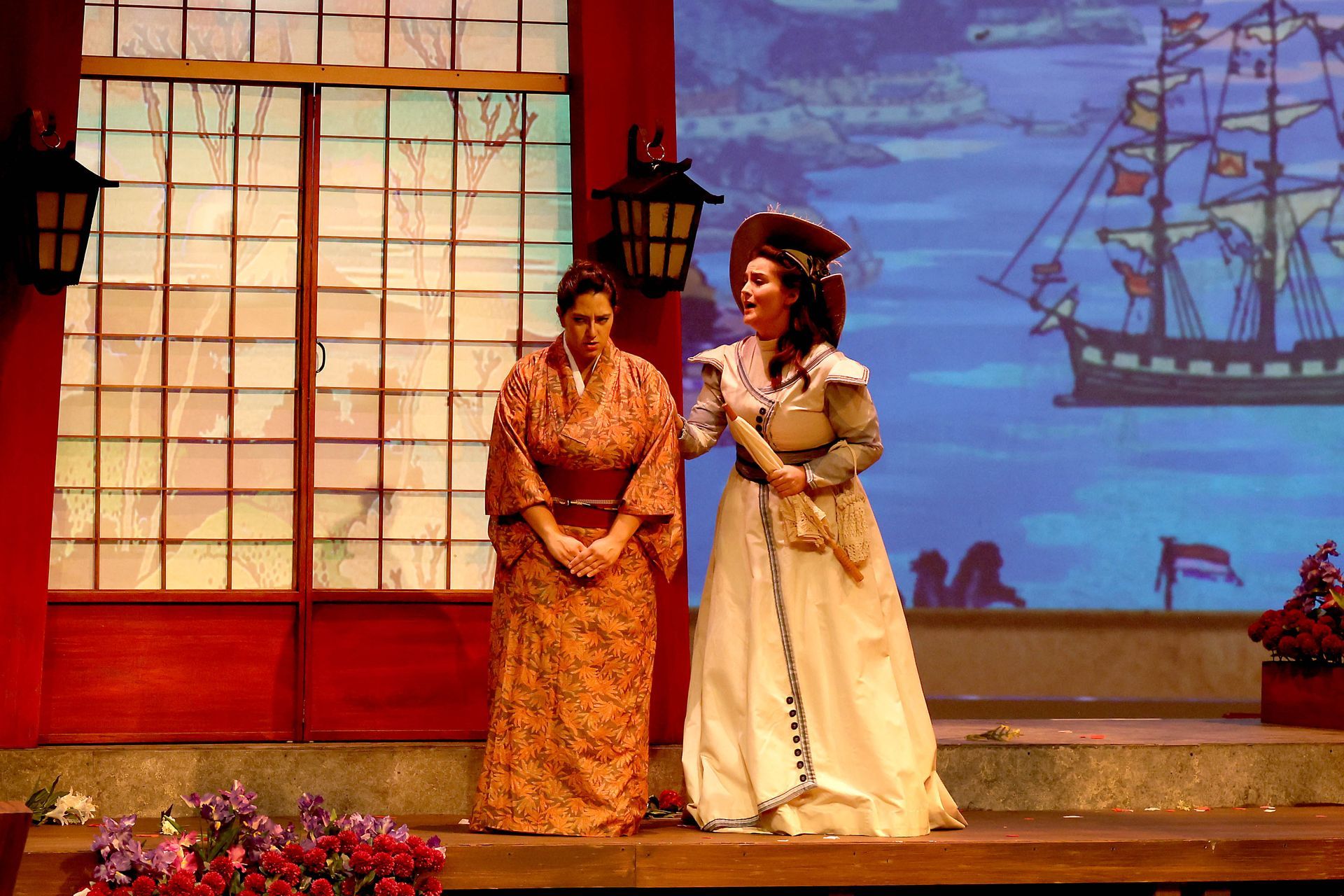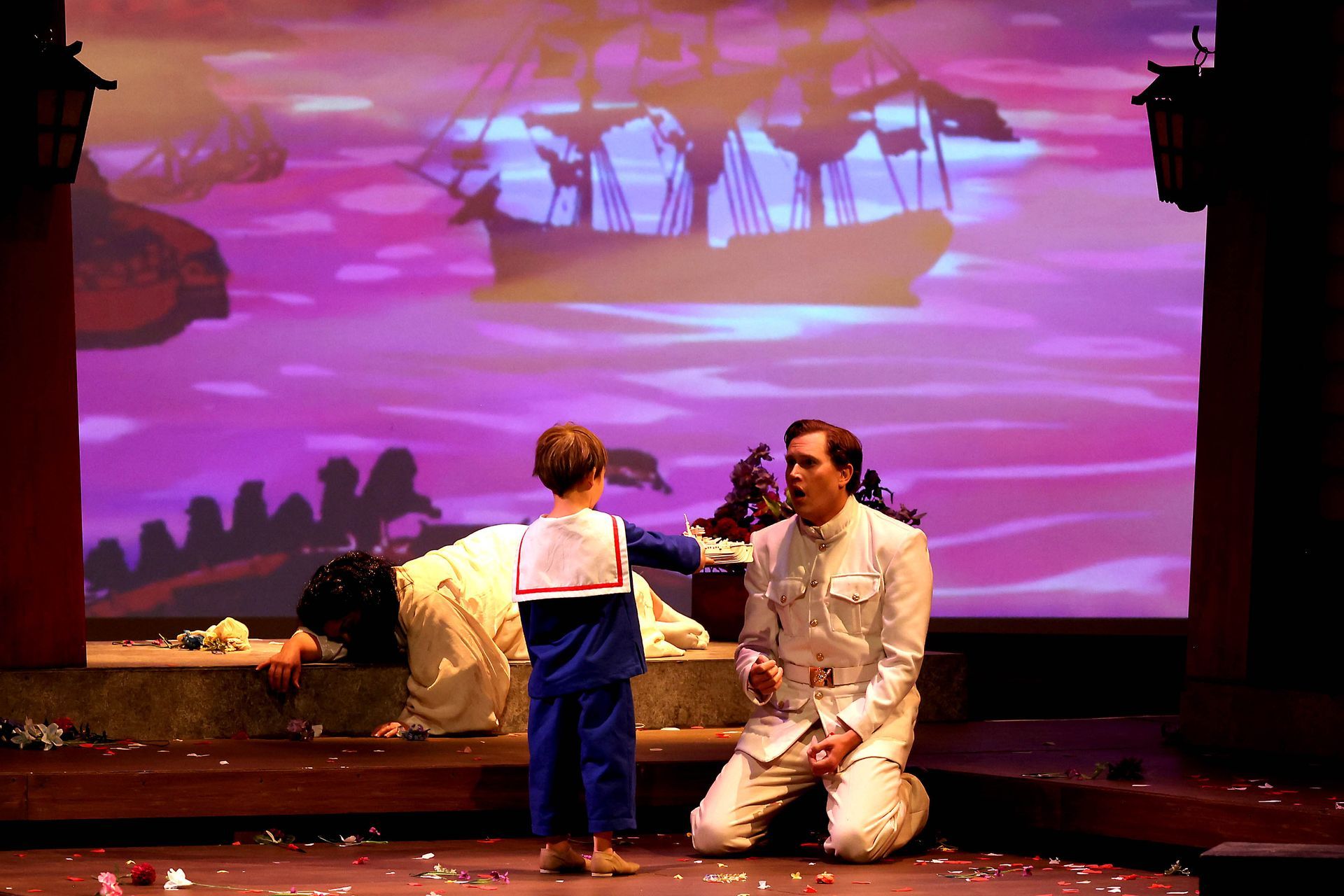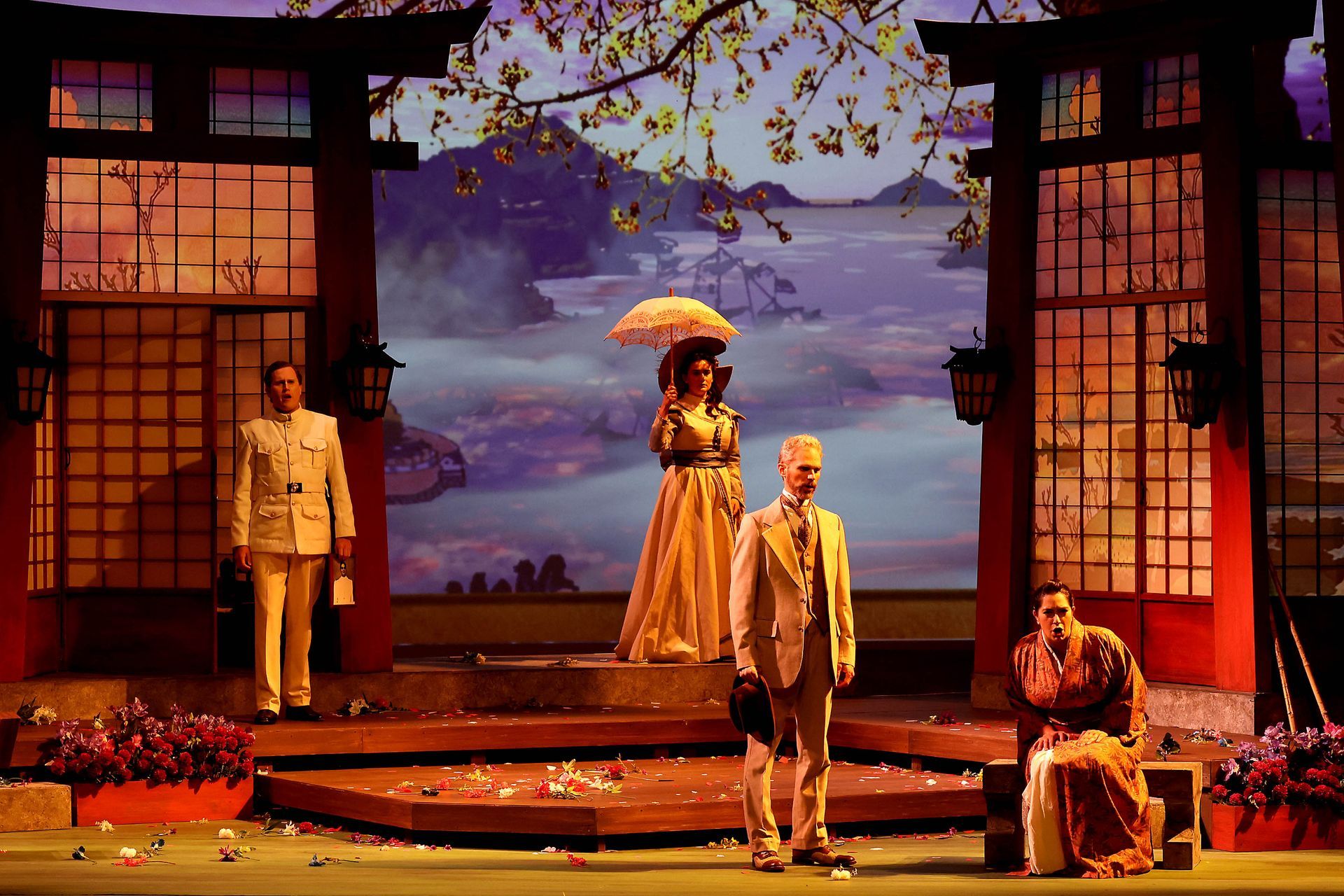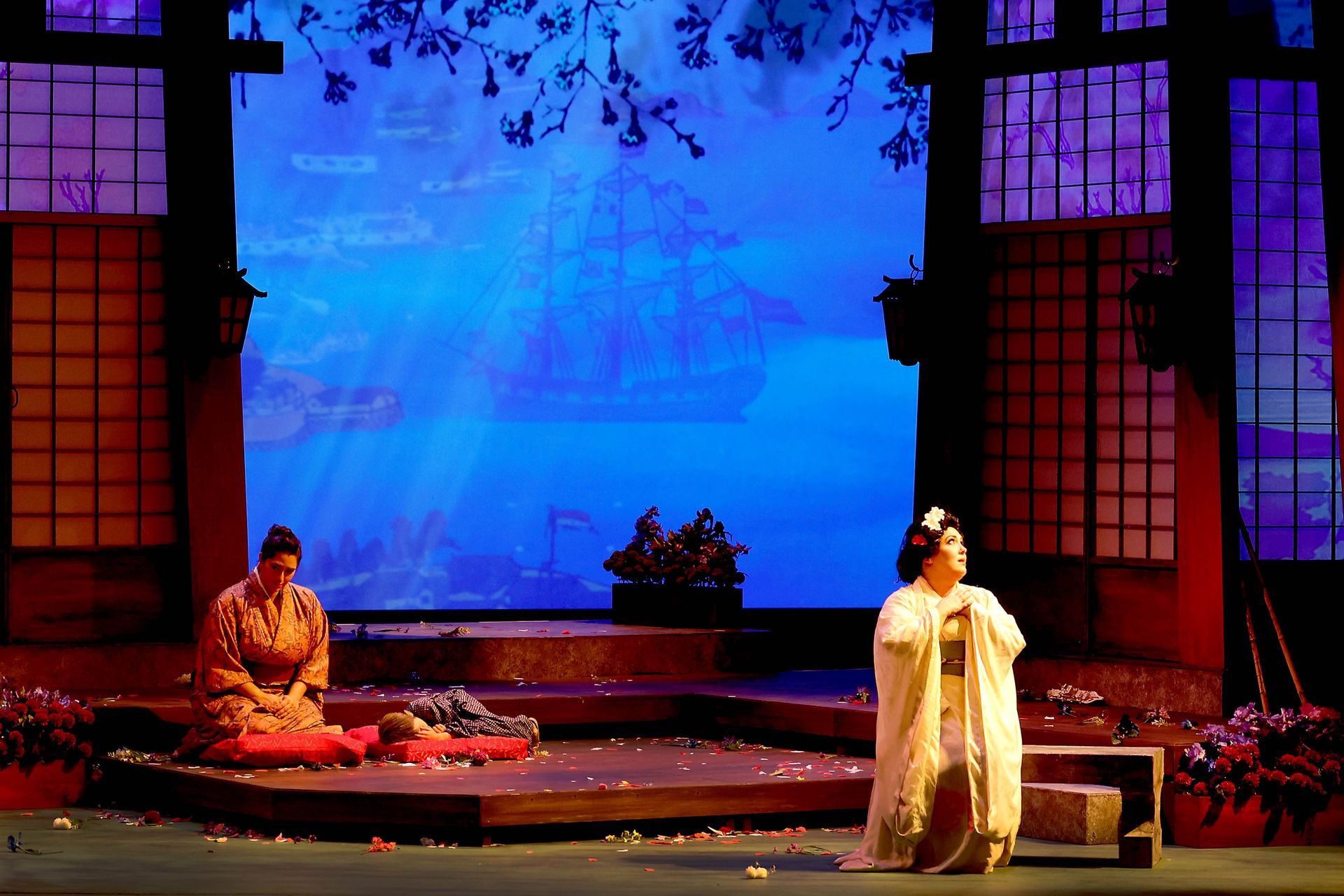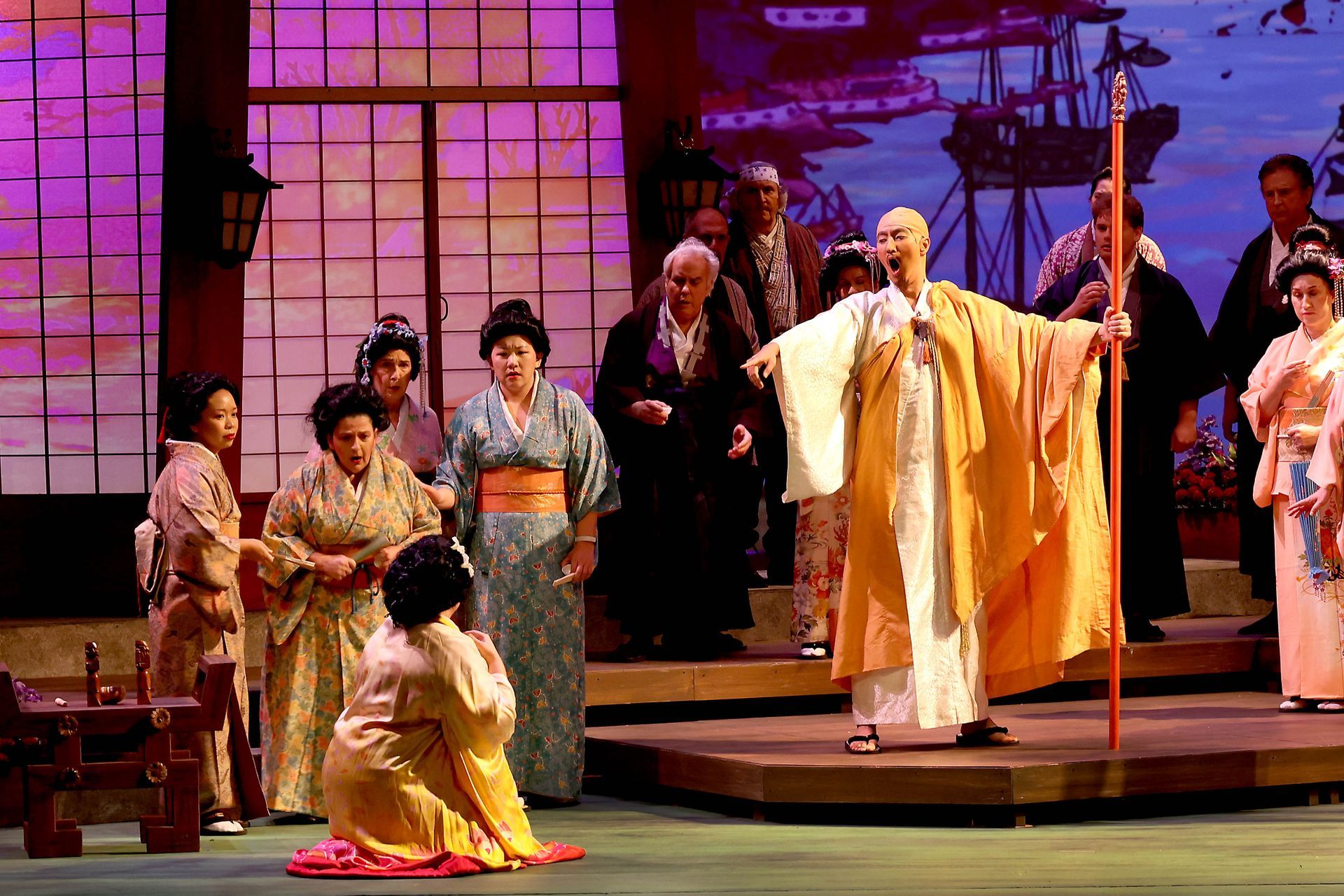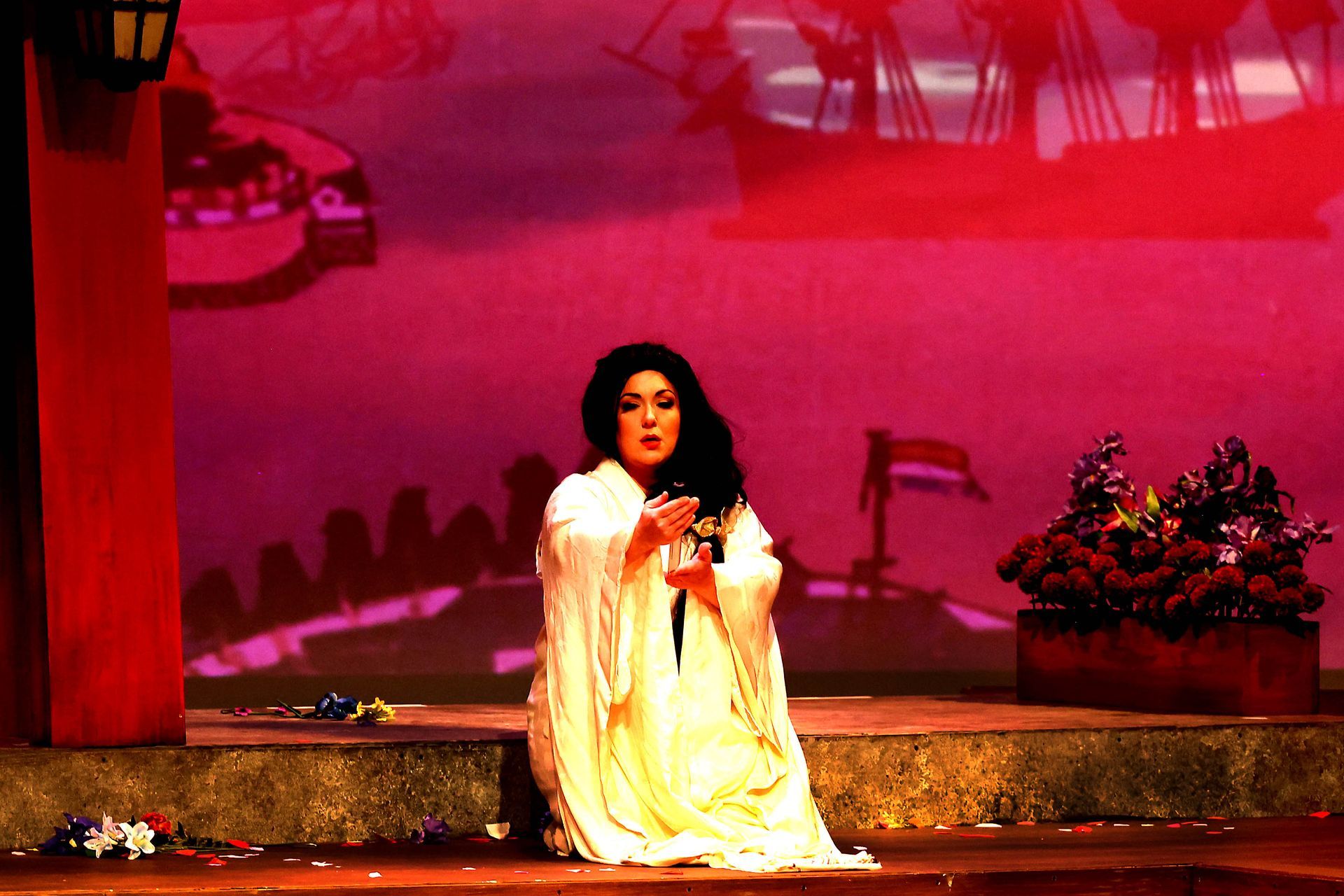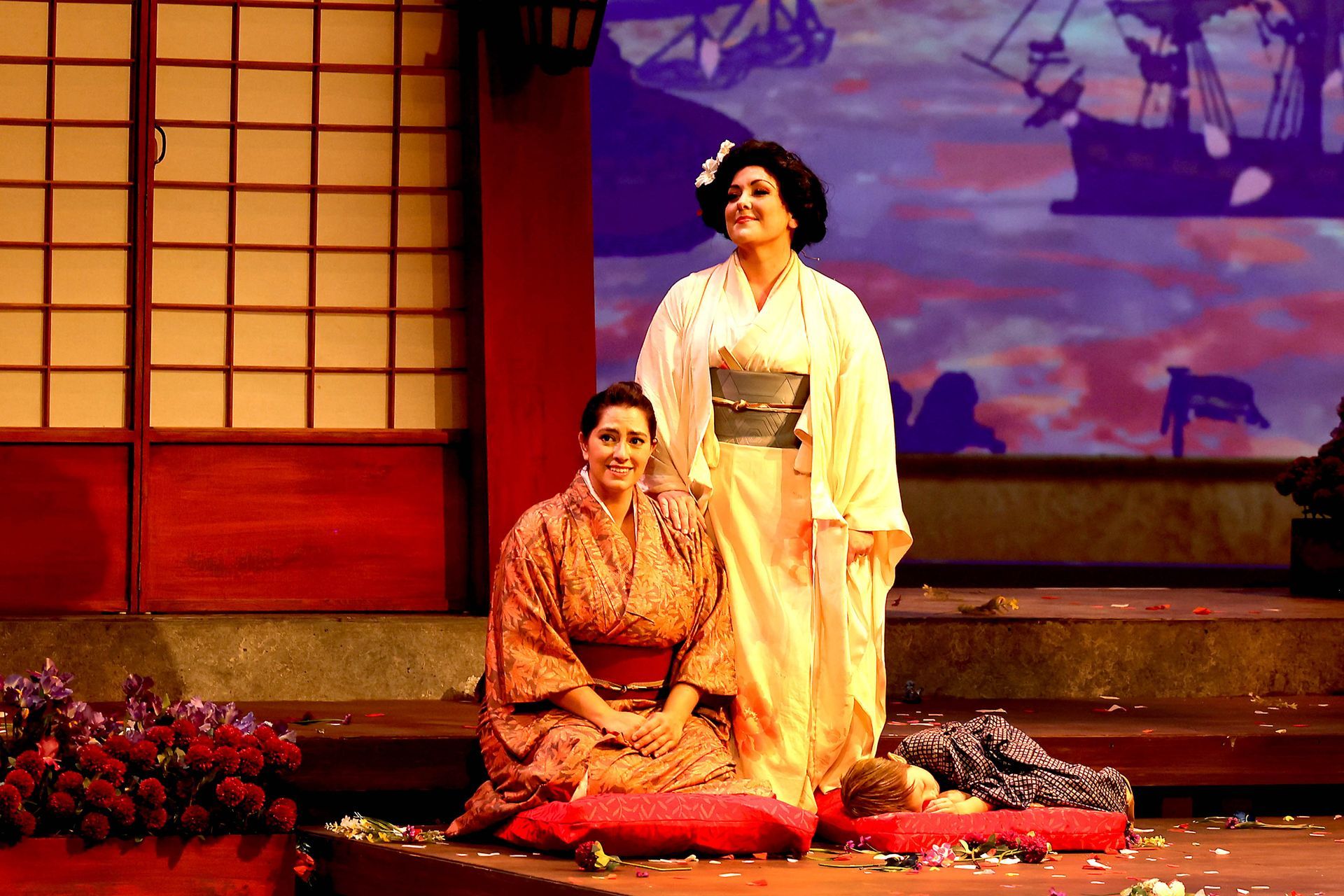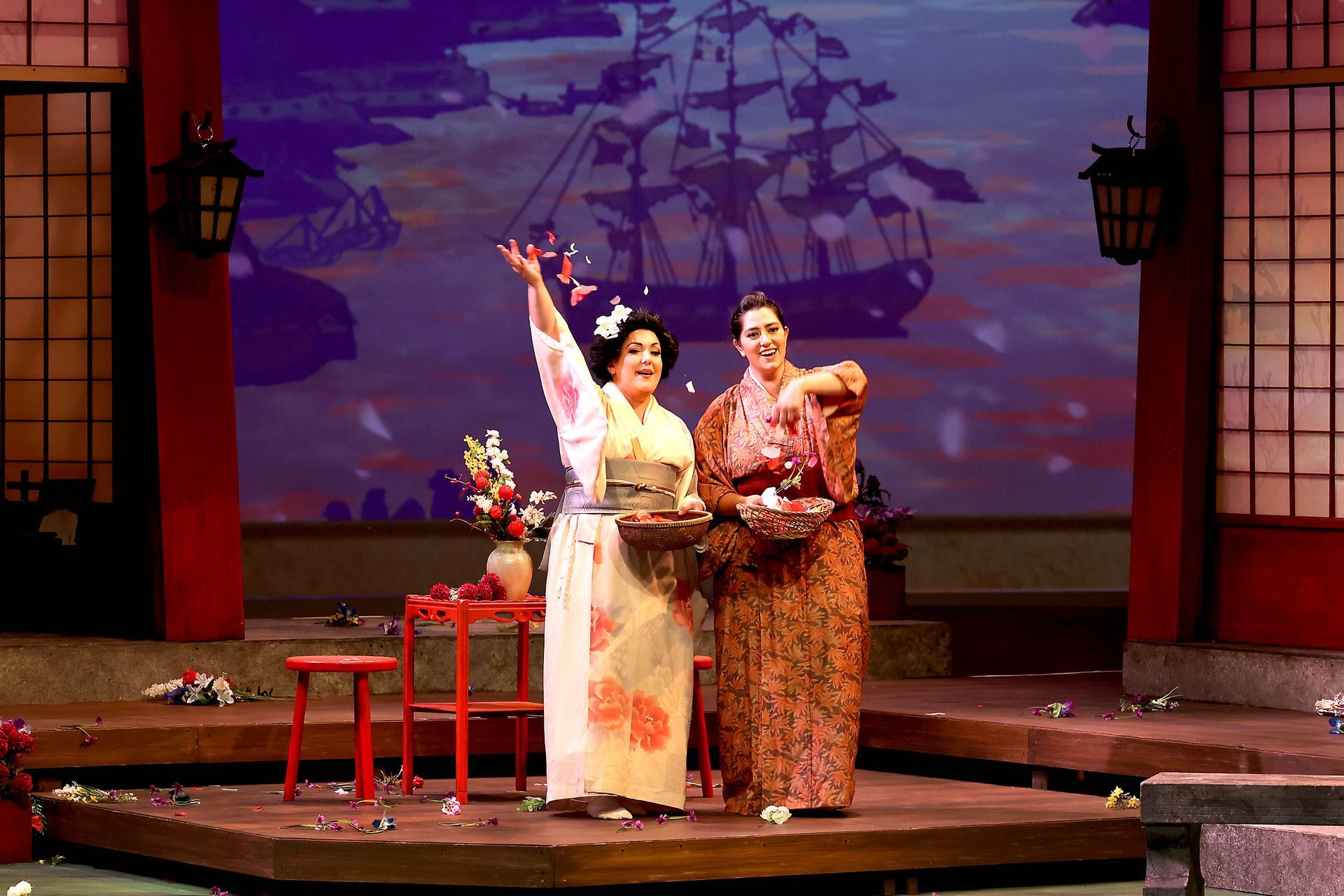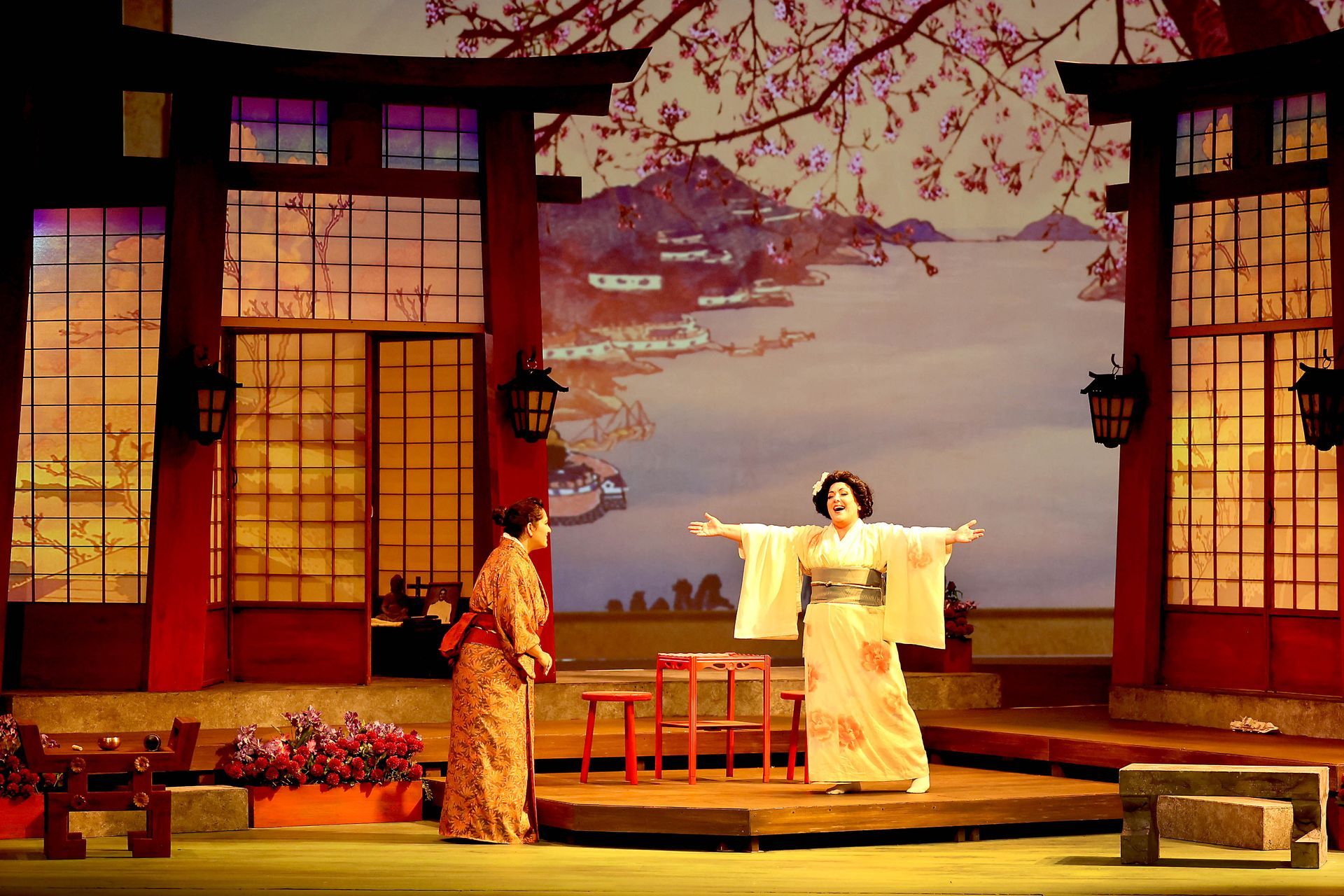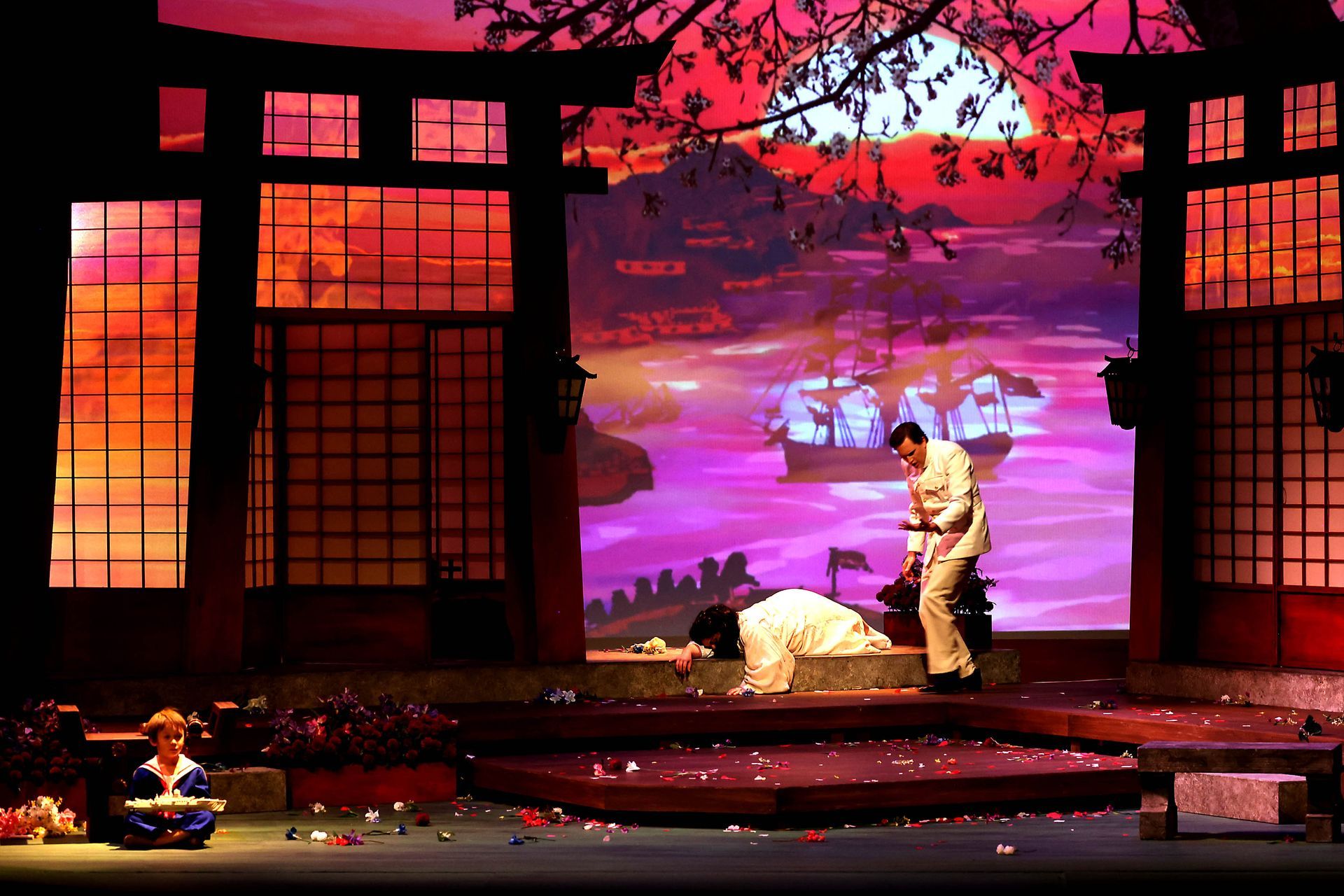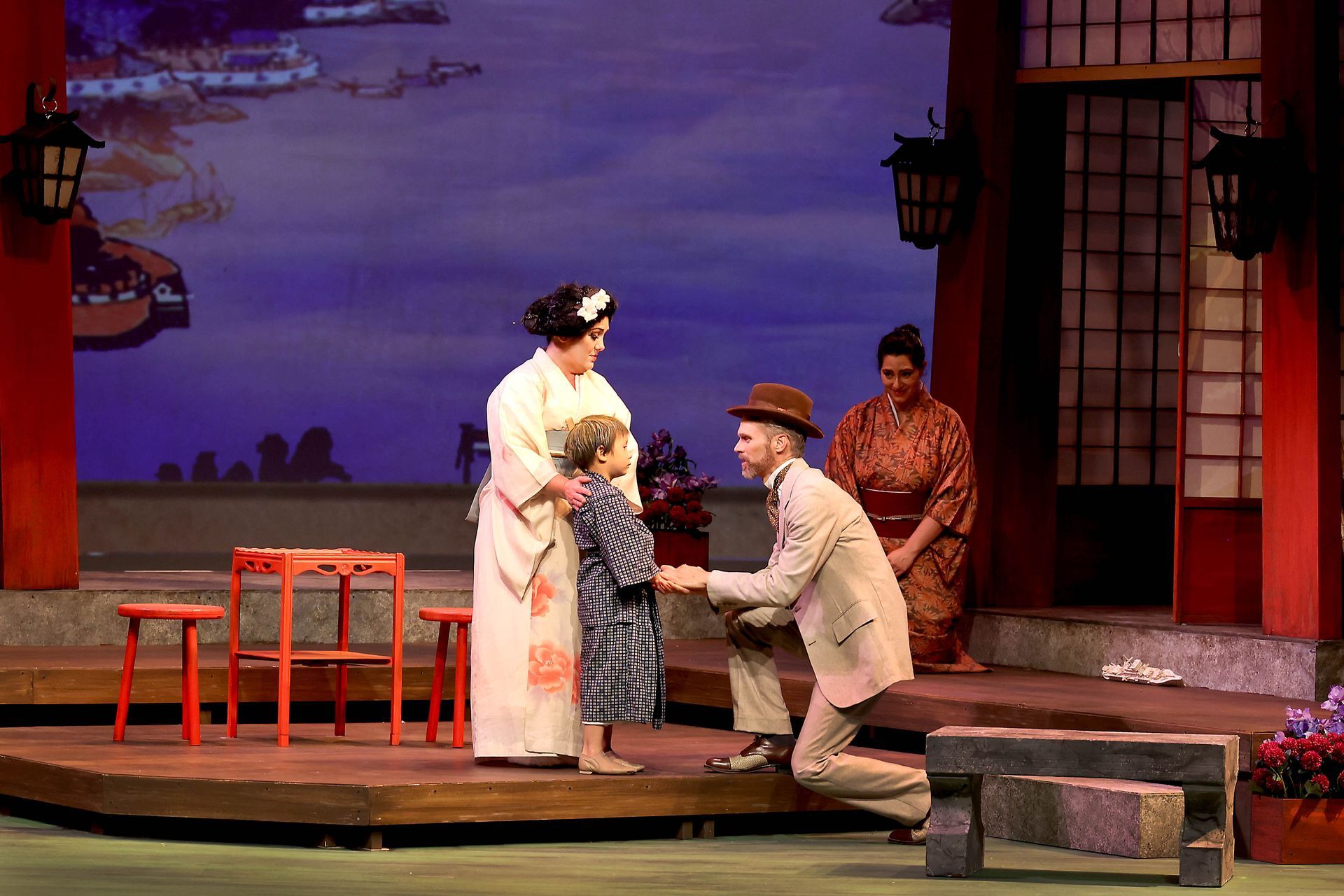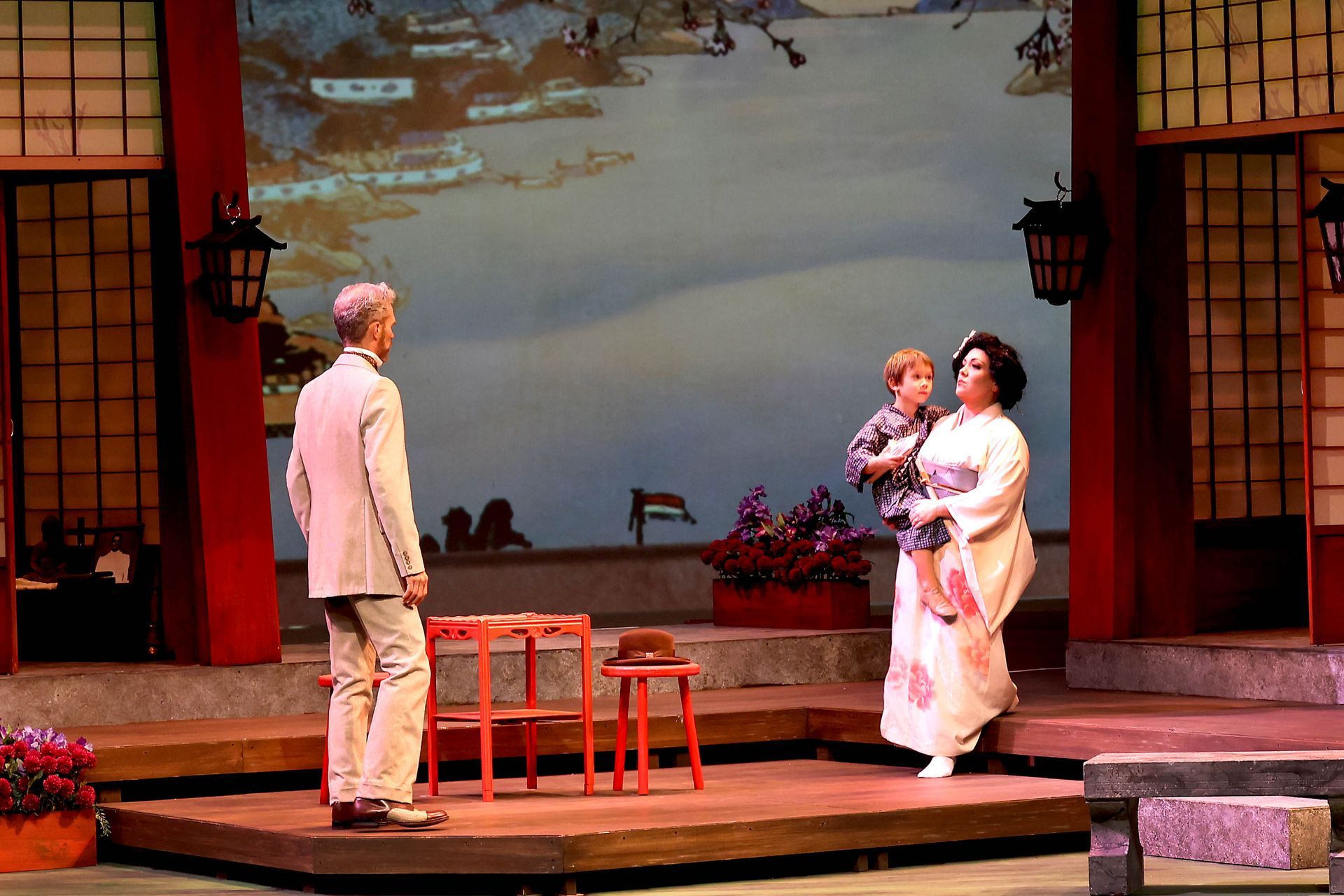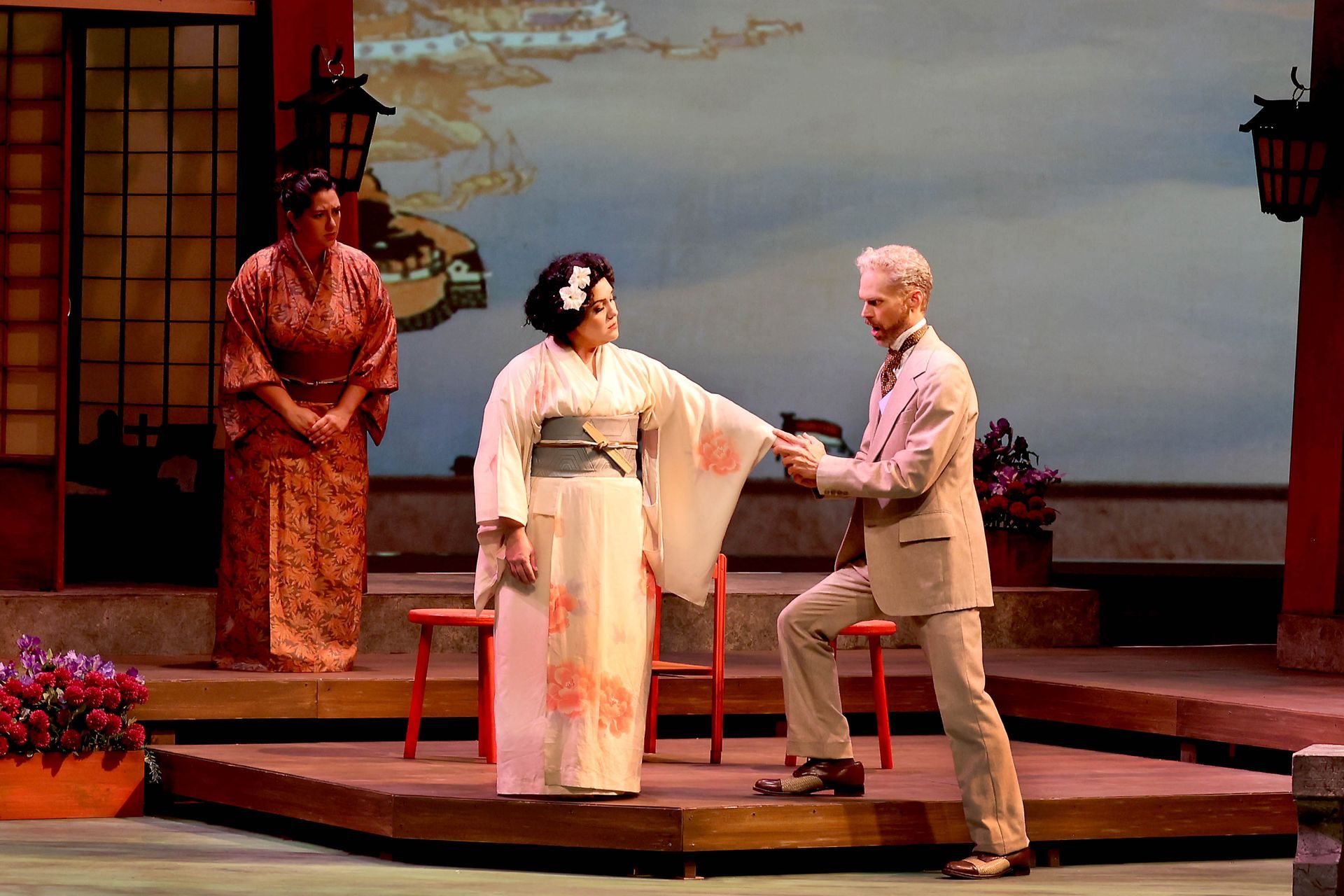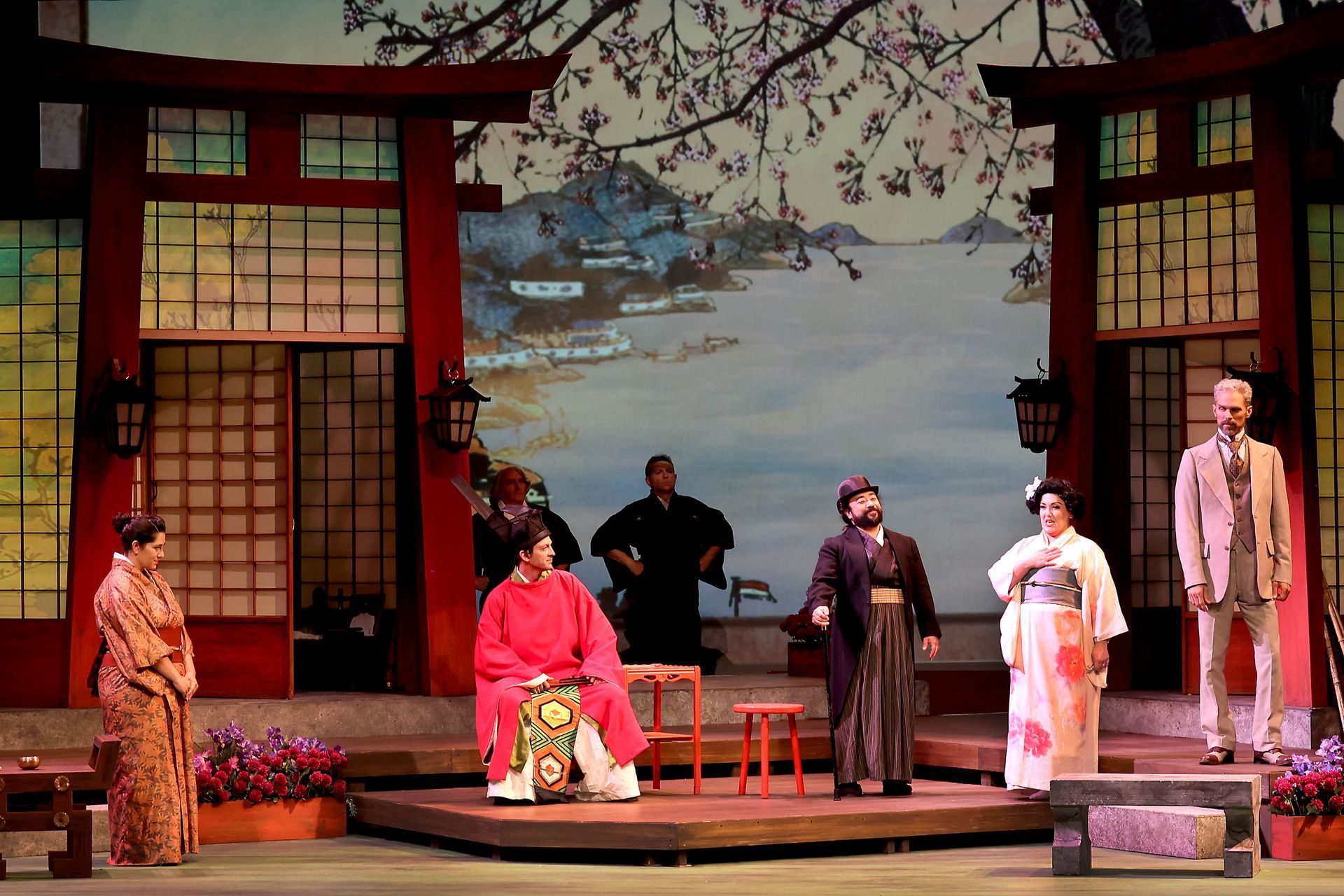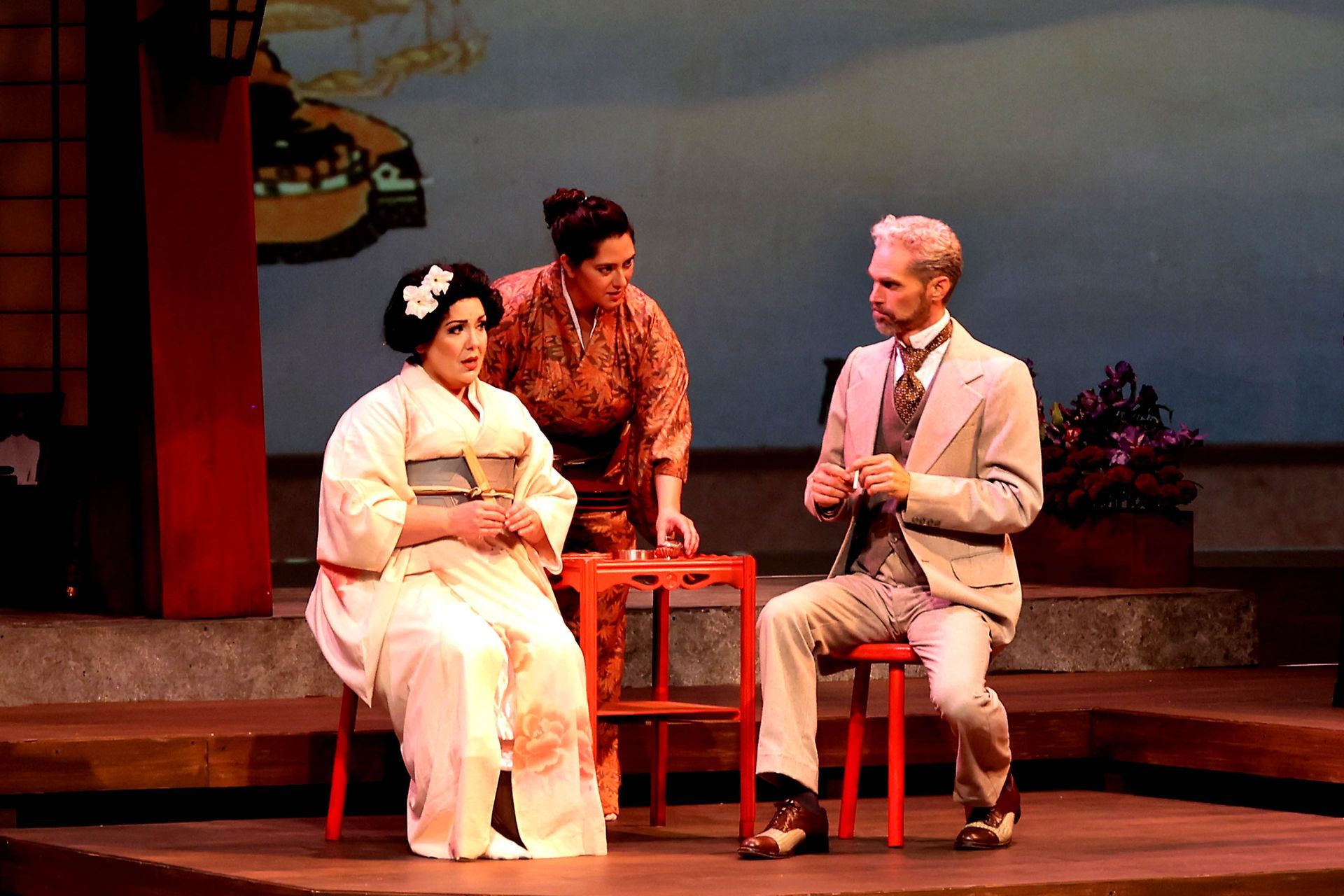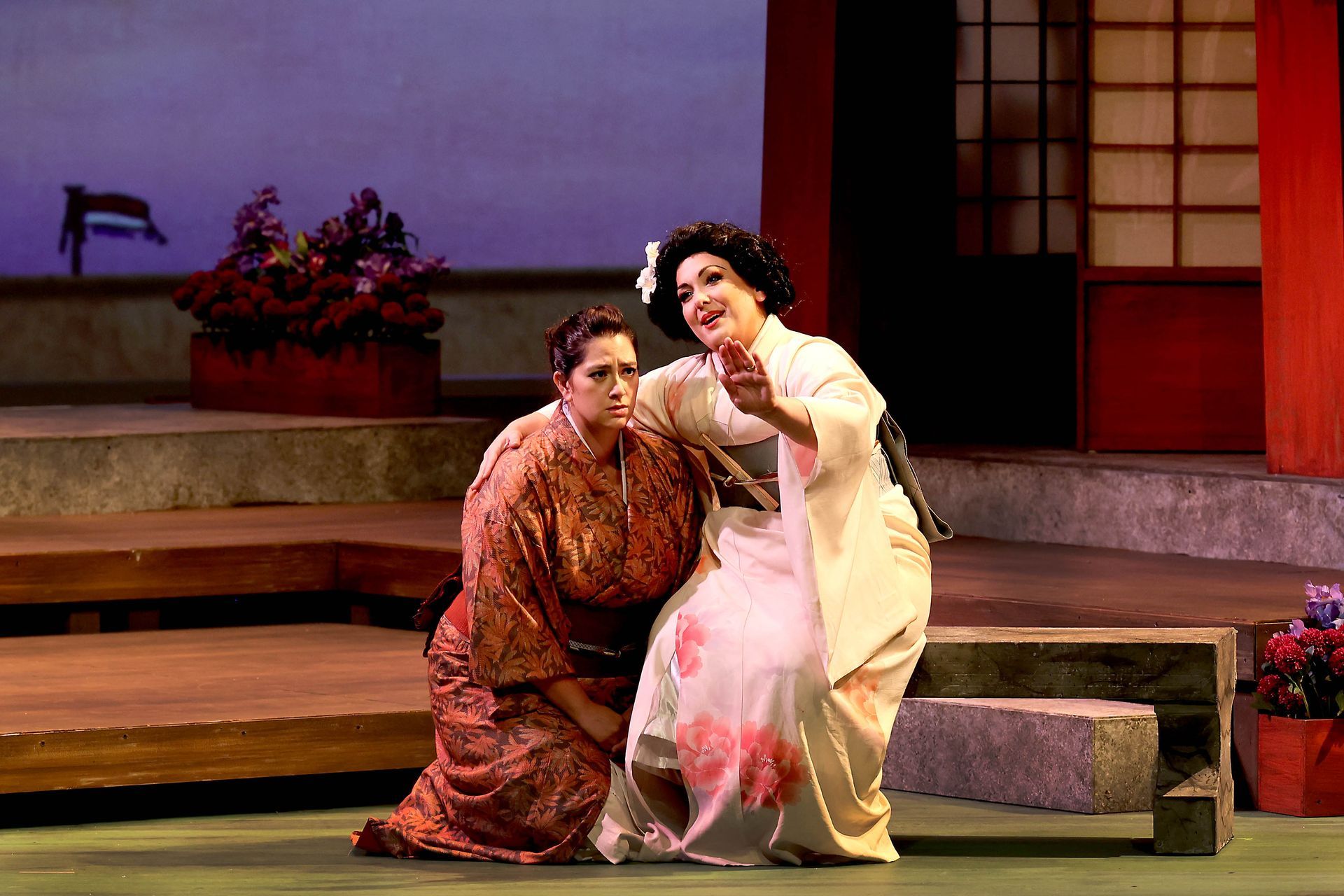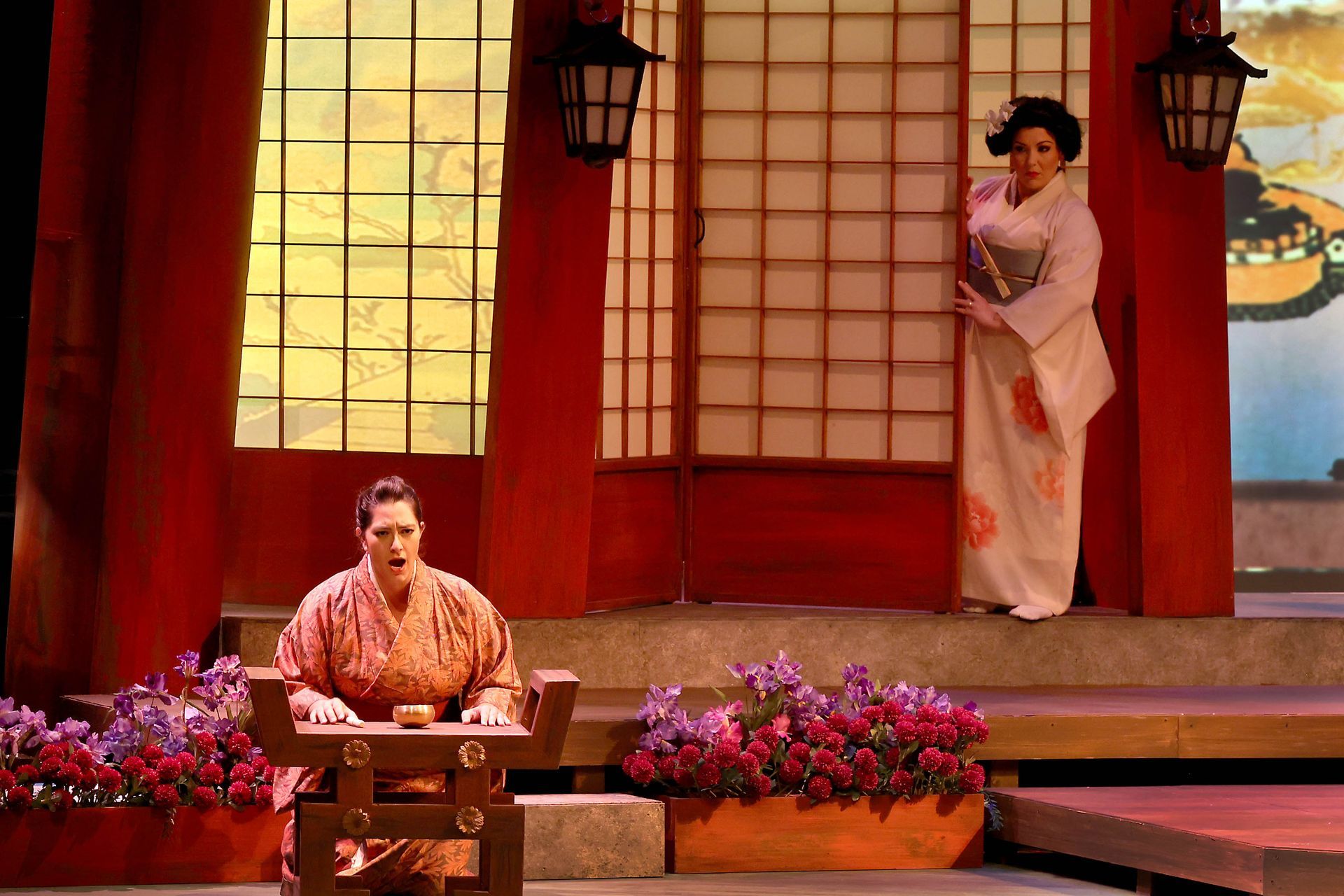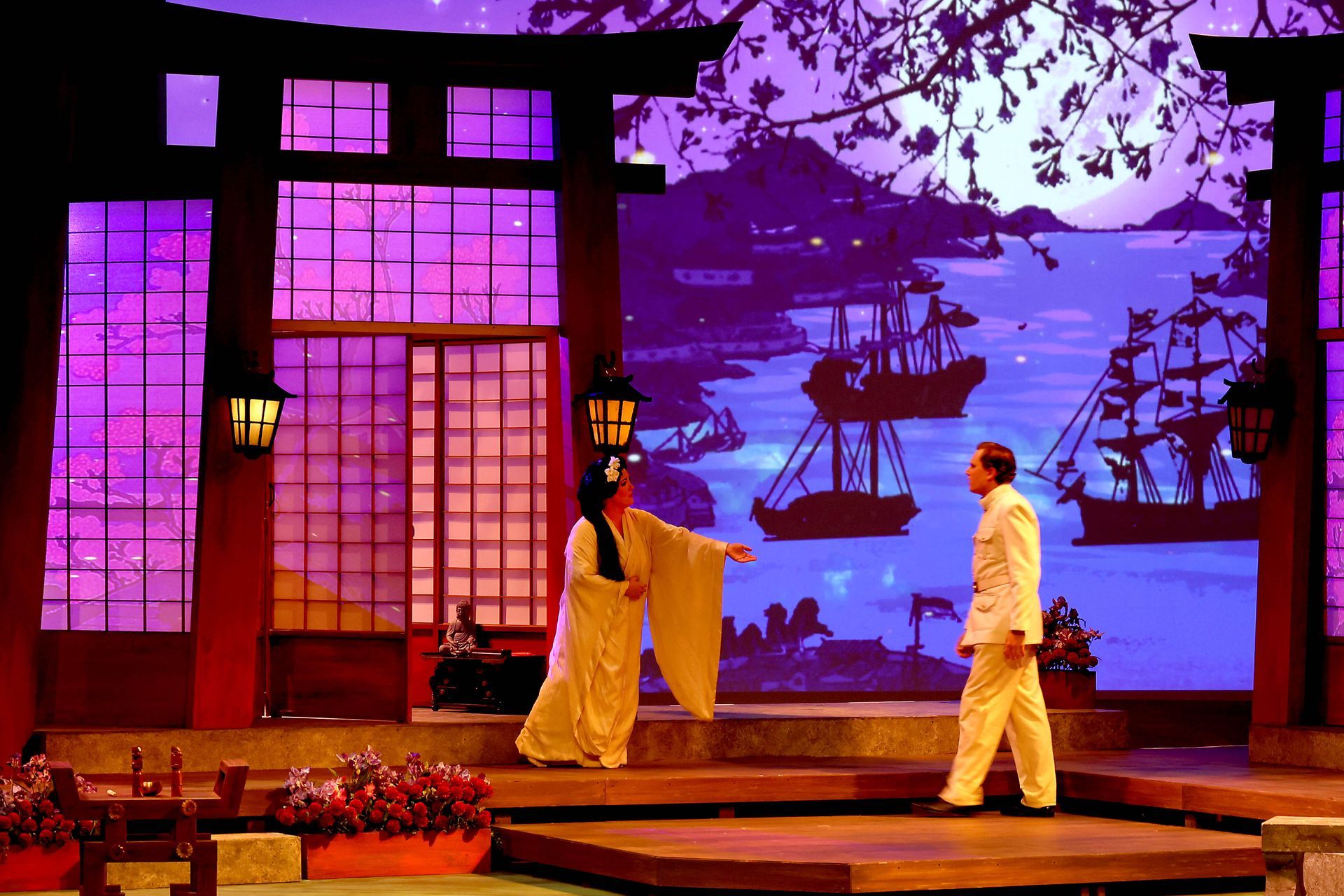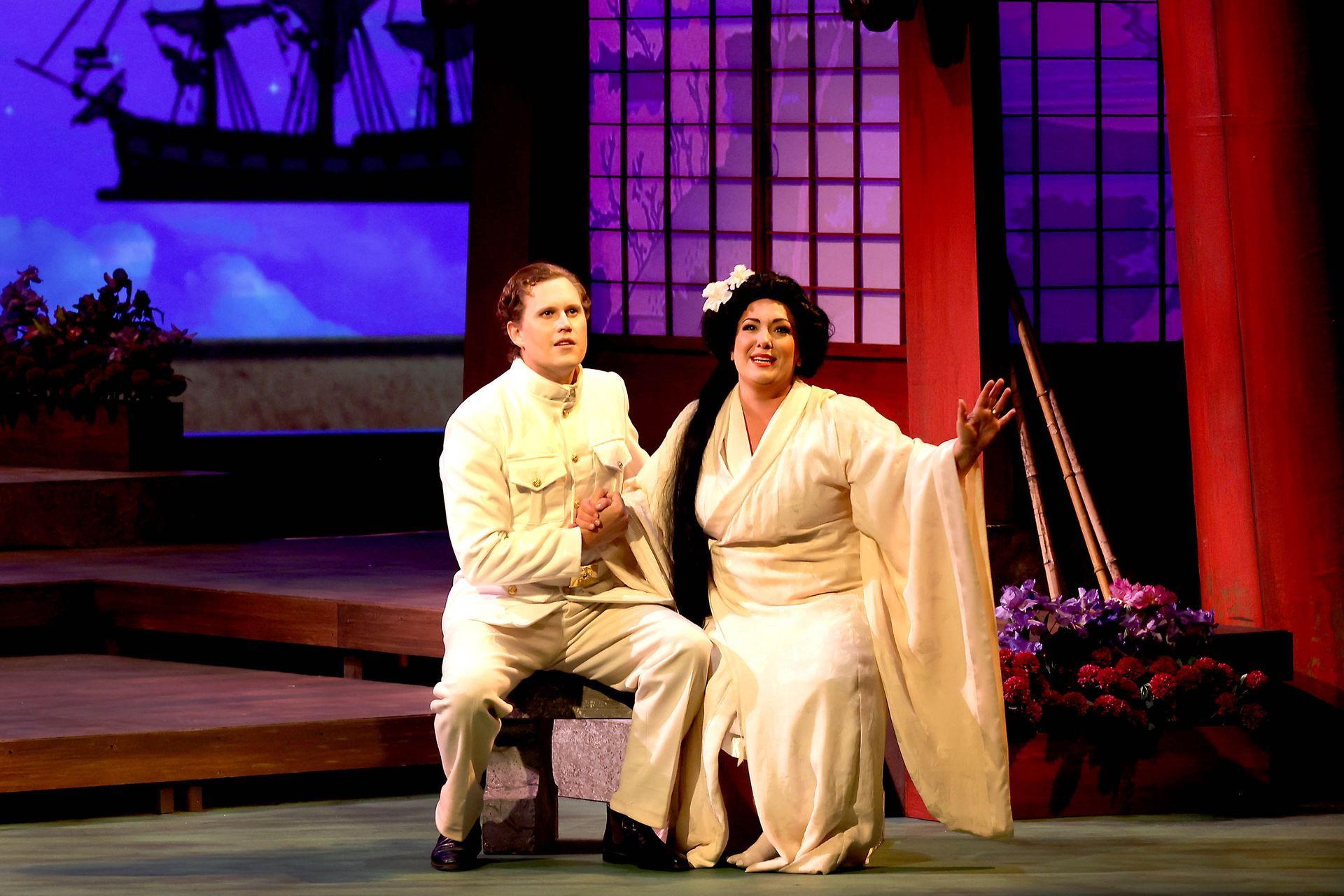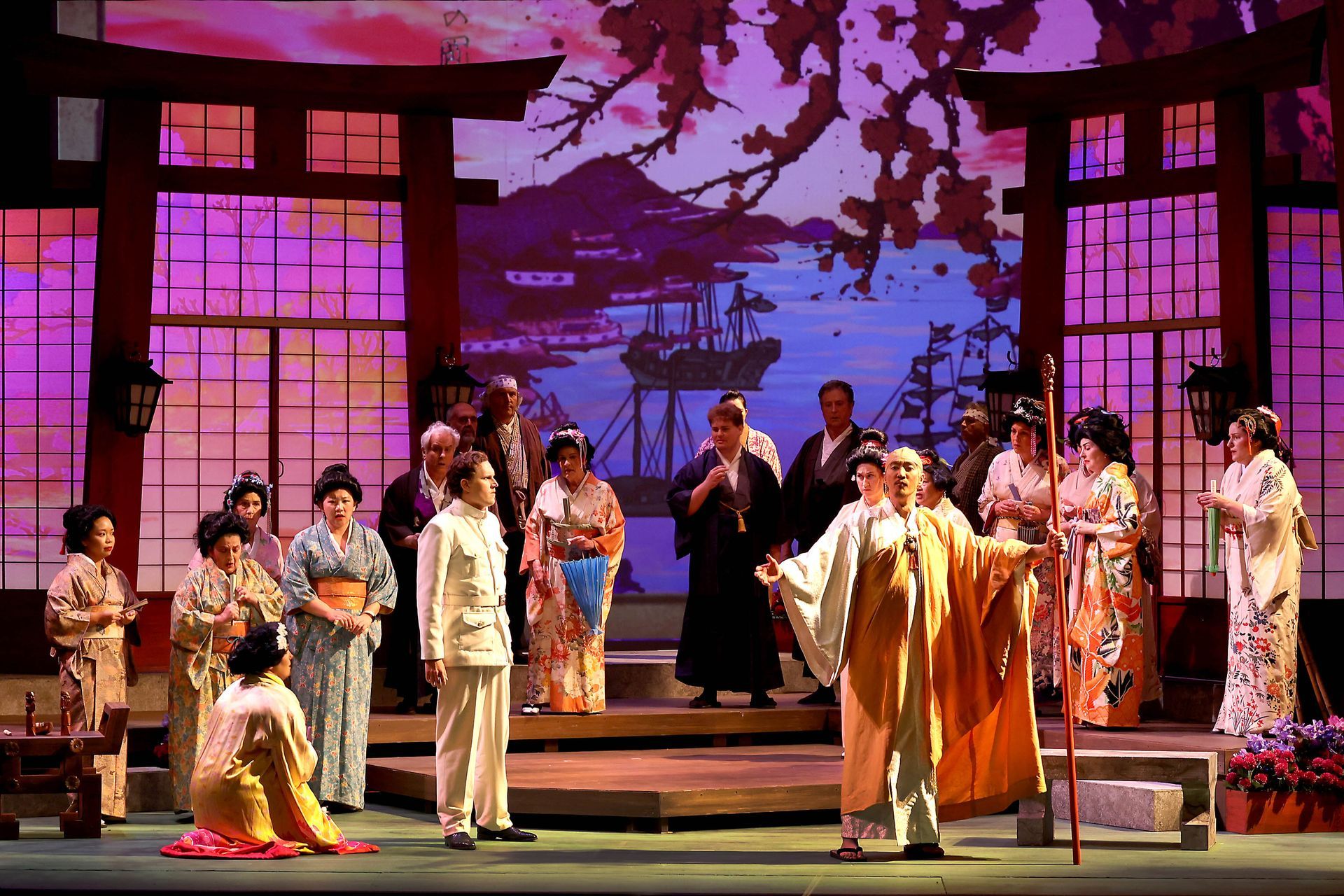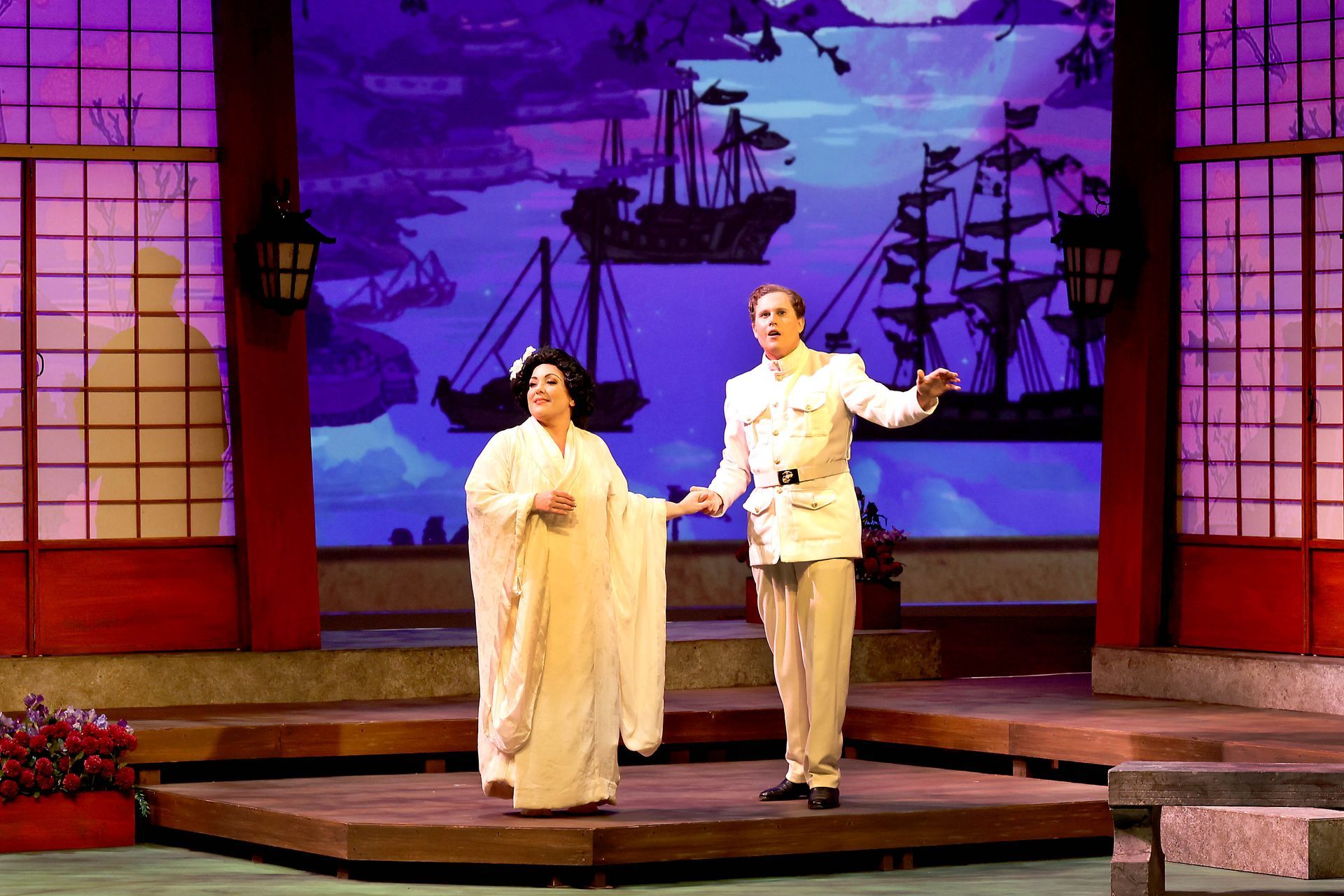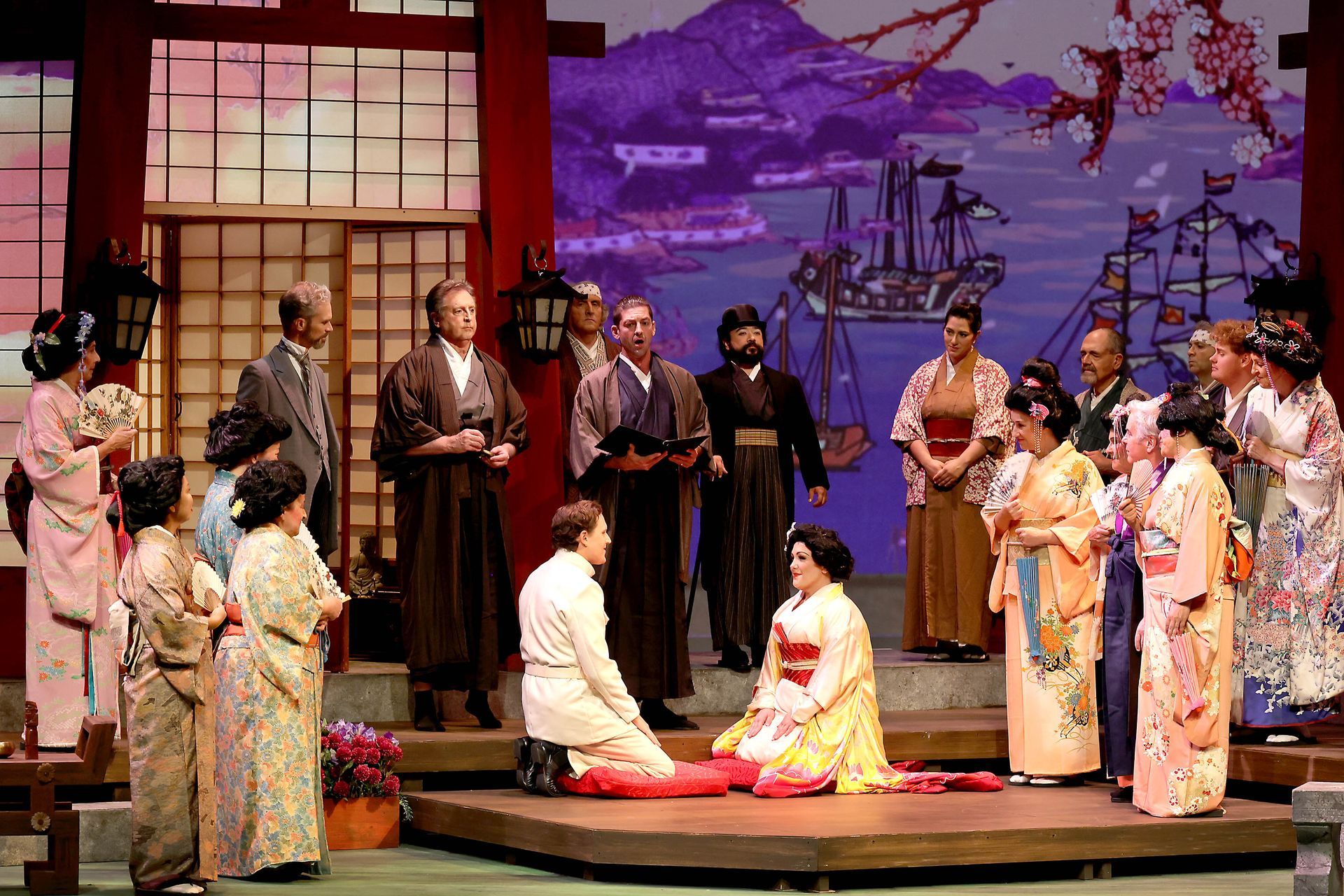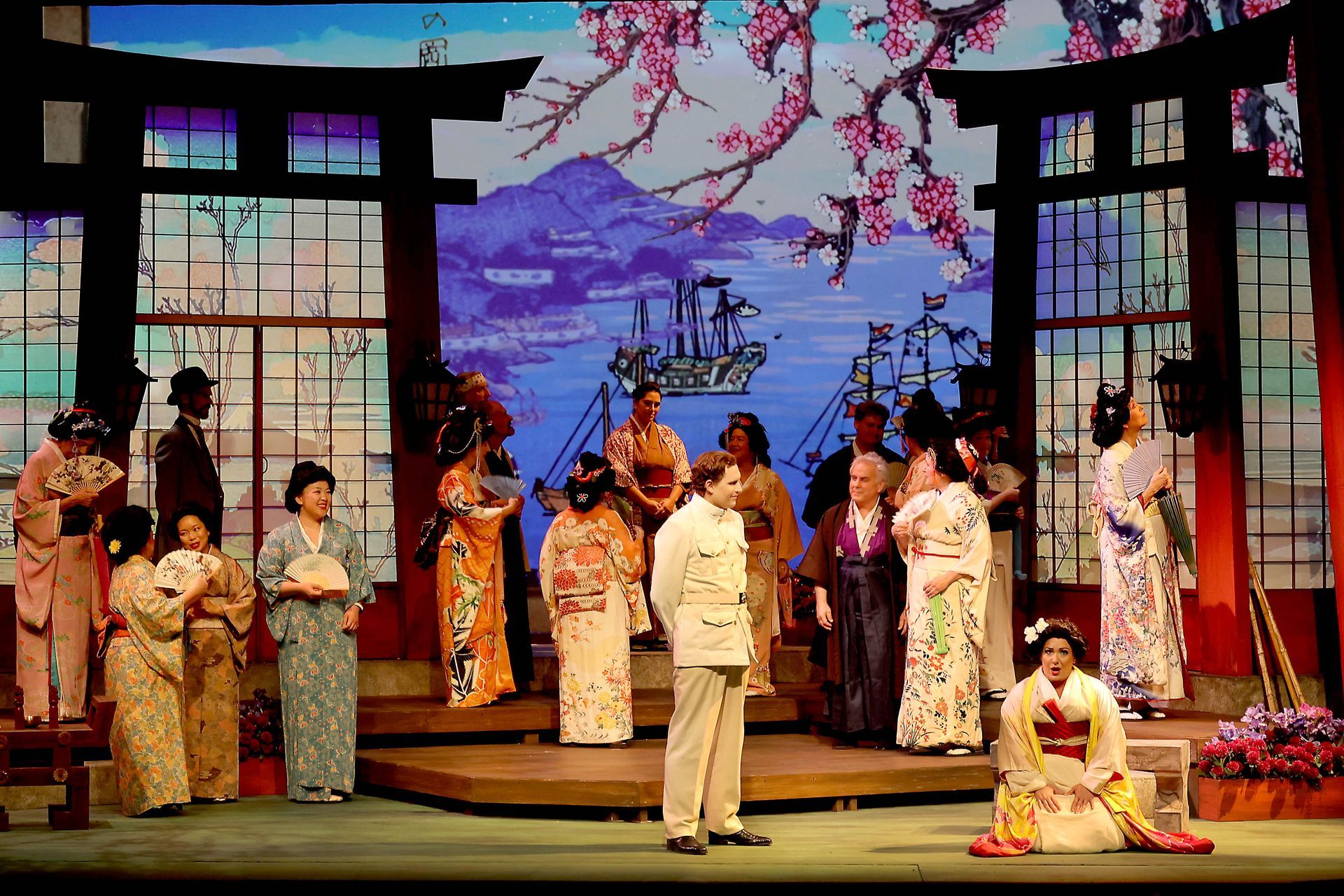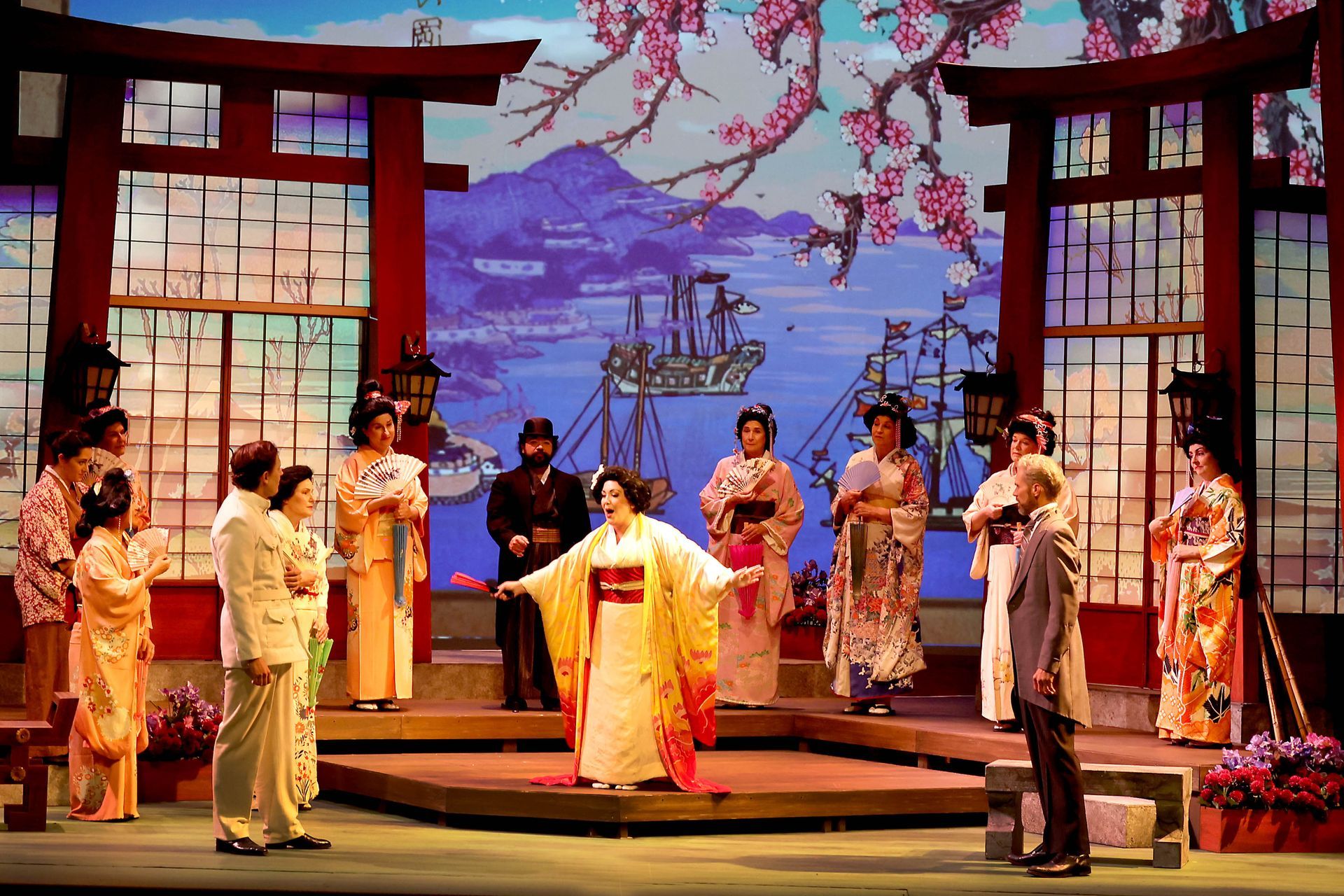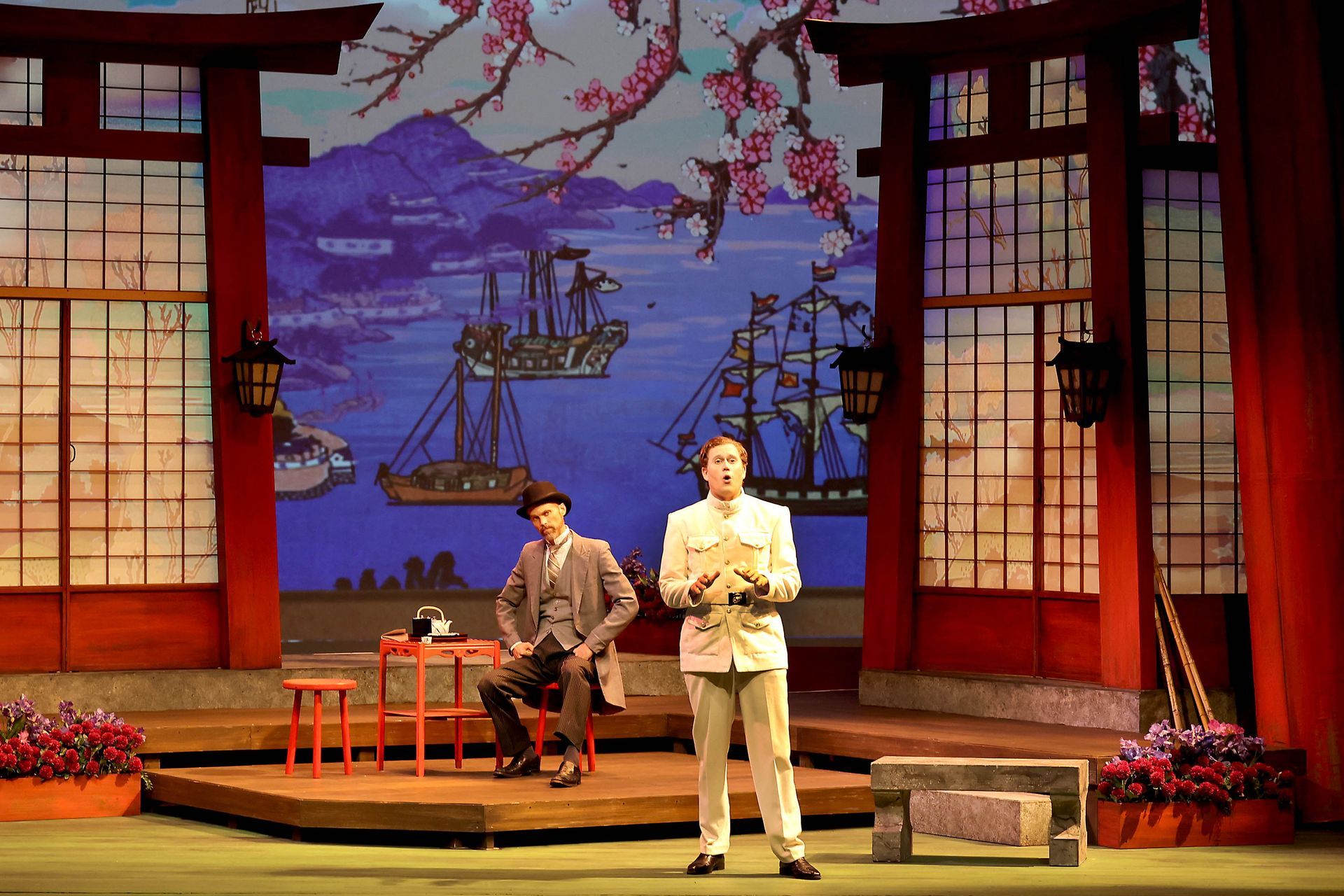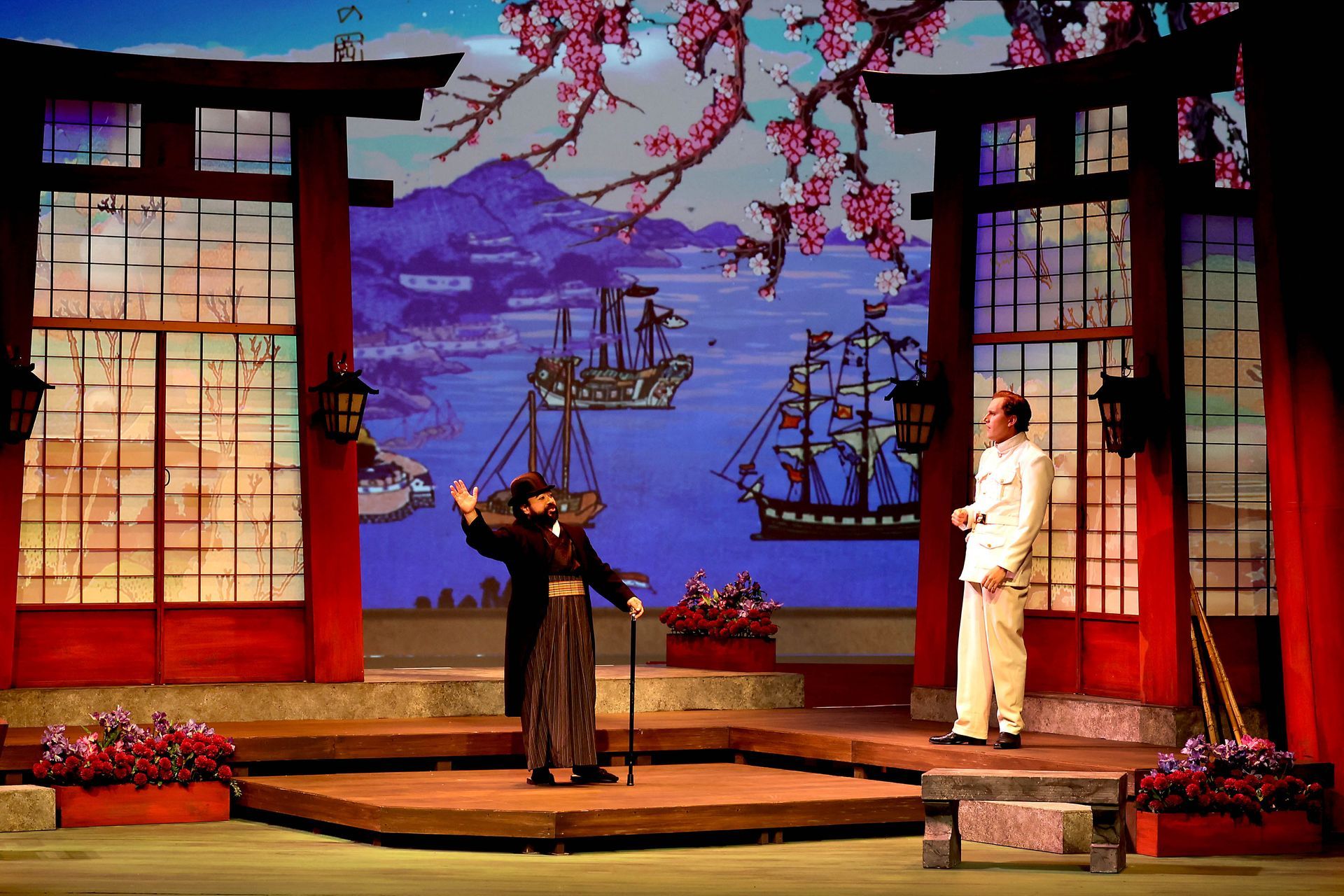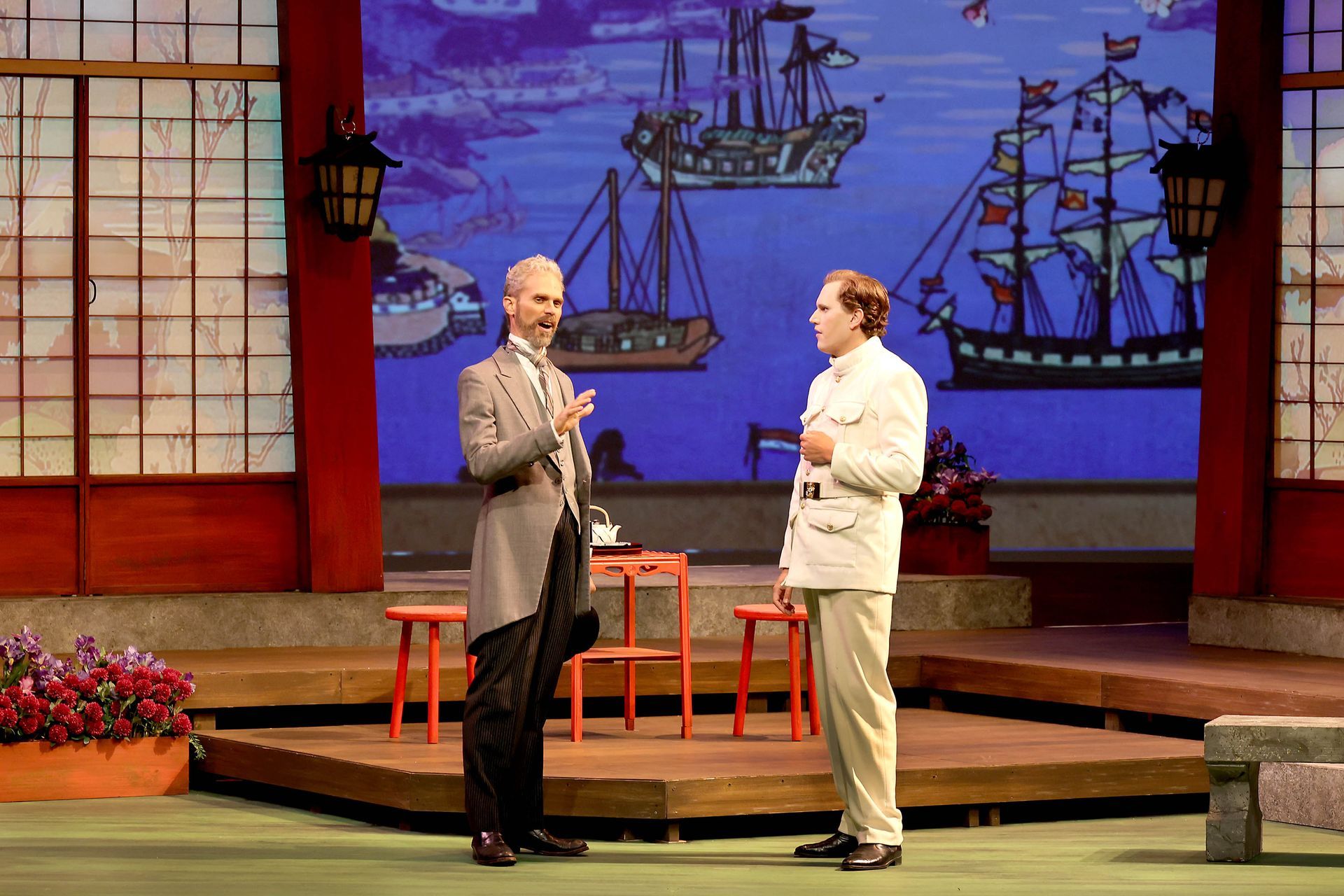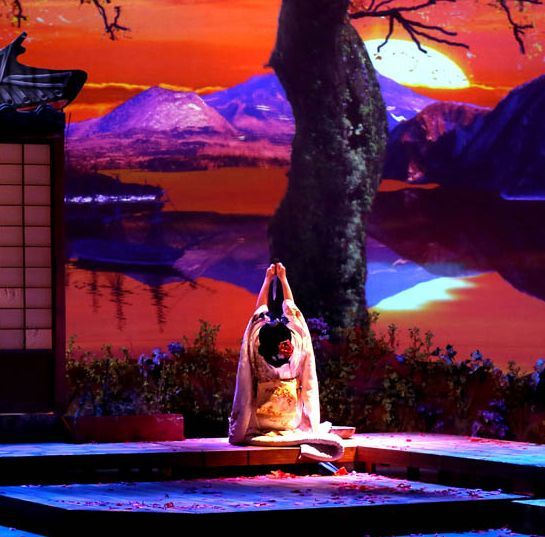
Madama Butterfly
Giacomo Puccini
Libretto by Luigi Illica and Giuseppe Giacosa
based on the play by David Belasco
Madame Butterfly: A Tragedy of Japan
Friday, Oct 13 - 7 p.m.
Sunday, Oct 15 - 2 p.m.
Saturday, Oct 21 - 2 p.m.
Sunday, Oct 22 - 2 p.m.
at the Lucie Stern Theatre
1305 Middlefield Rd., Palo Alto, CA 94301
Performances are 3 hrs long,
including two 15-minute intermissions.
FREE Preview with Piano
Thursday, Oct 5, 2023 - 7:00 p.m.
Holt Building
221 Lambert Ave., Palo Alto, CA 94306
Madama Butterfly 2023 - Media Gallery
PRODUCTION VIDEOS
About Butterfly
Creative team
José Luis Moscovich - Conductor
Richard Harrell - Stage Director
Peter Crompton - Set Designer
Callie Floor - Costume Designer
Danielle Ferguson - Lighting Designer
Shirley Benson - Props Designer
Giselle Lee - Sound Designer
Pictured: set designs by Peter Crompton
Cast
Cio Cio San - Toni Marie Palmertree
Pinkerton - Tom Mulder
Suzuki - Mariya Kaganskaya
Sharpless - Daniel Cilli
Goro - Arthur Wu
Zio Bonzo - Alexander Hahn
Yamadori - Michael Orlinsky
Imperial Commissioner - Michael Orlinsky
Kate - Nia Lewis
Chorus
Bruce Olstad, Chorusmaster
Joanne Bogart, JoAnn Close, Michael Good, Barry Hayes, Terry Hayes, Lynne Haynes-Tucker, Susan Hogben*, Logan Jenkins*, Ning Leng, Cynthia Mahood*, Joanne Newman, Christopher Nichols*, Lindarae Polaha, Terra Terwilliger, Kim Van Tran*, Megen Vo*
Supernumeraries
Didier Benoit
* First appearance with West Bay Opera
Orchestra
Butterfly Orchestra
Concertmaster | Kristina Anderson
Violin I | Emily Chiet, Virginia Smedberg, Stella Bonilla
Violin II Lisa Zadek, Frida Pukhachevsky, Toshia Nishi, Sofia Fojas
Viola Thomas Elliott, Mark Fish, Donny Lobree
Cello Joshua Minkus-Mahoney , Dahna Rudin, Thomas Shoebotham
Bass | Christy Crews
Harp | Gennaro Porcaro
Flute | Vivian Boudreaux
Oboe | Meave Cox
Clarinet | Stephen Zielinsky, Nicole Galisatus
Bassoon | Amy Duxbury
Horn | Cathleen Torres, Diane Ryan
Trumpet | Rick Leder/Chris Wilhite
Trombone | Tommy Holmes
Timpani | Don Baker
Percussion | Henry Reid
Christy Crews, orchestra manager
Virginia Smedberg, librarian
* First appearance with West Bay Opera
Madama Butterfly 2023 - Media Gallery
PRODUCTION PHOTOS by Otak Jump
Madama Butterfly 2023 - Press and Reviews
-
Read the review by Jeryl Moy in Splash Magazine
“Madama Butterfly” Soars at West Bay Opera
October 16, 2023 Splash Magazines Contributor Music & Art
West Bay Opera delighted its patrons October 15th by performing Puccini’s brilliant opera, Madama Butterfly the way it was meant to be performed. Sung in the original language, Italian, with the classic tragic libretto unchanged, this performance was spellbinding in its beauty and gut-wrenching in its emotion. The tragedy of the timeless libretto (English translations on screens were easy to see but not distracting) was felt by those of us lucky enough to be surrounded by some of the most beautiful voices in the world. The theater temperature was comfortable, but I must admit I had chills for much of the performance, evoked by the pure beauty of both the soprano and tenor
voices.
I am new to the Bay Area, and I hope residents of Palo Alto and the surrounding towns realize
how rare it is that community theater can provide a world class opera like this one. This theater
is one we need to cherish, as it allows us to experience opera at the highest level in a
comfortable, intimate setting without spending a fortune or dealing with transportation and
parking issues. People who think opera is not for them might change their minds after attending
Madama Butterfly at West Bay Opera.
Madama Butterfly was written in 1904, based on the play by David Belasco, “Madame Butterfly:
A Tragedy of Japan.” Giacomo Puccini wrote the score; Luigi Illica and Guiseppe Giacosa
authored the libretto. The story is set in Nagasaki in the early 1900’s. It unfolds in 3 acts
spanning 3 years.
Act 1 begins as American naval officer, Benjamin Pinkerton, rents a house in Nagasaki. The
house comes with servants and a geisha wife, Cio Cio San, known as Madama Butterfly.
Pinkerton decides to marry her in a formal ceremony, without regard to what the commitment
means. She falls in love with Pinkerton and believes the love is mutual. Pinkerton returns to
America, but vows to come back for her. She does not tell him she is pregnant with his son.
Butterfly’s family shuns her.
Three years pass. As Act 2 opens, Butterfly is nearly destitute, but still believes her husband will
return. She watches for him and eventually is rewarded by the arrival of his ship.
Unfortunately in the final Act, Pinkerton returns with an American wife. He is remorseful, and
promises to take his son and care for him. Devastated, Butterfly gives up her son and commits suicide just at the moment Pinkerton comes in to look for her, but her sacrifice is complete.
The original play was popular at the turn of the century because audiences around the world
saw Pinkerton as an allegory for the American empire: well meaning, but not fully aware of its
impact on the cultures with which it came into contact. This Puccini masterpiece is timeless.
West Bay Opera’s version did enhance the experience with fabulous sets, an amazing
orchestra, and a soprano who graced the set every time she took the stage. But it remained true
to the original. I would praise them so highly for that alone, yet there are so many other reasons
to go see this opera in this intimate setting.
Toni Marie Palmertree, soprano, was breathtaking in her performance as Cio Cio San. She has
graced the stages of the Metropolitan Opera, Chicago Lyric Opera, San Francisco Opera, and
other venues of global fame. She knows how to draw an audience in to her story and make
them feel her joys and her pain. As I said, her voice gives you chills.
Tom Mulder, tenor, is world famous as well. He commanded the stage as Pinkerton. His voice
also brought chills with its purity. While the emotions he evoked from the audience were not
always good, they were exactly those that were intended. Tom Mulder had the right inflections,
expressions and gestures to portray Pinkerton as he was meant to be portrayed.
Mariya Kaganskaya, mezzo-soprano, sung the part of Suzuki, Madama Butterfly’s maid and
confidant. While Ms. Palmertree commanded the stage, Ms. Kaganskaya held my attention with
every note she sang. Her mezzo-soprano solid strength was the perfect compliment to
Butterfly’s emotional soprano.
Daniel Cilli, baritone, portrayed the American Consul with the emotion that was probably echoed by everyone in the audience. He is powerless to prevent the tragic story from unfolding and
appears ashamed of how Pinkerton behaves. This role cannot be easy, but Mr. Cilli’s
performance and his voice were just right.
I don’t have space to mention all the cast members; they were fabulous. I do have to give
special thanks to the orchestra, and Jose Luis Moscovich, the conductor. Their role in this
opera is critical. The emotion waxed and waned with the music. The emphasis of each section
of the orchestra was perfectly placed in each scene. The musicians do not get individual
recognition, but I noticed how they made this opera flow.
The West Bay Opera’s 68th season is too short. Madama Butterfly only runs through next
weekend. Their second program is Corpus Evita which opens February 16th. It provides an
unbelievable opportunity for those of us in the Bay Area to enjoy world class opera in our
community setting.
https://splashmags.com/index.php/2023/10/16/madama-butterfly-soars-at-west-bay-opera/#gsc.tab=0
-
Read the review by Michael J. Vaughn in the Palo Alto Weekly
Review: West Bay Opera's straightforward 'Madama Butterfly' reveals its enduring power
FacebookTwitterEmailPrintShare
by Michael J. Vaughn / Contributor
It's a sign of great works that they reveal new ideas on repeated viewings — often, a new insight with each new performance. At a time of unsettling conflicts in Israel and Ukraine, West Bay Opera's straightforward production of "Madama Butterfly" reveals Puccini's opera as a profound indictment of colonization and imperialism.
This idea comes out largely through the character of Benjamin Franklin Pinkerton, the U.S. naval officer who marries a teenage geisha and sets up house outside Nagasaki. Pinkerton just might be the most toxic villain in Puccini's canon, in that he pretends to be anything but: charming, sincere, romantic. And then proceeds, regardless, to wreck all the lives around him.
Tenor Tom Mulder brings to Pinkerton a certain underground awkwardness, as if he's trying hard to be cool and have swagger, but really he's just faking it. Mulder's singing fits this bill also. He doesn't have the most powerful voice, but he sings with great care and craft, and matches well with his new bride in the first act's prolonged love duet.
The production design by Peter Crompton is subdued and lovely, a pair of screened-off rooms before a projection of the harbor, regularly augmented with fog banks, fireflies and cherry blossoms. I especially enjoyed the use of the screens to project silhouettes, notably the wedding-night kiss.
To a straightforward production, add a straightforward Butterfly. Toni Marie Palmertree is a classic Cio-Cio-San, even down to the ritual gestures associated with the role. She employs her soprano in a dazzling manner, regularly producing voluptuous swells of tone that send chills down the spine. The regular place of the aria "Un bel di" in the recital repertoire can obscure the fact that, in the context of the opera, it springs from a simple conversation with Butterfly's maid, Suzuki. This little telling of a dream — her vision of her long-lost husband returning to her — grows to dramatic proportions in a remarkable way, and serves as a fine demonstration of Palmertree's dynamic range.
Mezzo Mariya Kaganskaya plays a strong Suzuki — wise, mysterious, and always knowing more than she lets on. During the flower-strewing scene (in anticipation of Pinkerton's return), the unison passages between her and Palmertree are gorgeous.
Baritone Daniel Cilli performs the American consul Sharpless with calm and grace, while still managing to convey the disgust he feels at Pinkerton's abandonment of his Japanese wife. Bass Alexander Hahn gives a fearsome account of The Bonze, scaring everyone in the theater as he condemns Butterfly's conversion to Christianity. Playing the suitor Yamadori, baritone-tenor Michael Orlinski remains impressively stoic as Butterfly skewers him with insults. Yamadori's dazzling outfits are always an expected treat of this scene, and Callie Floor's scarlet robe does not let us down. Kudos to stage director Richard Harrell for getting the most from his players in these side stories.
The women's chorus does not quite capture the magic of Butterfly's entrance music, but does a beautiful job offstage with the humming chorus, as Butterfly and Suzuki await Pinkerton's return. The orchestra's delicate playing in this piece, under director Jose Luis Moscovich, is superb, along with elegant string passages in the love duet.
What fun it must be to play percussion in one of Puccini's Asian-inspired operas (the other being the Chinese-themed "Turandot"), as Henry Reid demonstrates in the third act. A short list includes side drum, triangle, cymbals, tam-tam, bass drum, glockenspiel, Japanese bells and tubular bells. We all could have done without, however, the cha-cha ringtone that one patron contributed during the death scene. I picture Cio-Cio-San setting down her knife and saying, "Oh, sorry. That's my son's soccer coach."
Speaking of Butterfly's son, Chien-Li Matilda Lin does a wonderful job of playing Sorrow, and I have always wondered what it must be like, sitting on some strange lady's lap as she sings with that scary-loud voice. The final moment, in which Sorrow offers his toy boat to his aggrieved father, is exquisite.
Michael J. Vaughn is the author of 28 novels. His latest, "Punks for the Opera," is due out next month. He has worked as an opera critic for more than 35 years.
https://www.paloaltoonline.com/arts/2023/10/19/review-west-bay-operas-straightforward-madama-butterfly-reveals-its-enduring-power
Our productions are made possible, in part, by the generous support of our key partners:


